#ryo meta
Explore tagged Tumblr posts
Text
Kaito x Stacey: being seen authentically & the value of consent
A little background: Last February, I heard that Sekoguchi Ryo was going to have a significant role on Zettai BL 3 and I got really excited but had nowhere to channel that energy, so I decided to start a sideblog where I’d post one screenshot per day of Stacey, his character from Kikai Sentai Zenkaiger. To keep up my screenshot supply for the blog, I rewatched the series a lot, which led to thinking about the show in a deeper way than I had before. I'd already known I was a fan of the Stacey and Kaito ship, but I hadn’t given much thought to why. All that rewatching helped me develop my thoughts about it more.
I usually write this kind of relationship-focused analysis stuff about BL series. I don’t know if tokusatsu fans want to read this sort of thing about toku shows, or if the folks who read my BL posts would be interested in a relationship analysis about a toku ship. Well, I guess I need to get this out of my system either way, so here goes!
All of the gifs in this post were made by @my-rose-tinted-glasses, who is so generous with her time and considerable skills that, well, I don't know, I'm going to have to knit her a sweater or something. I mean, seriously, how pretty is the gif below? Even if you don't want to read my ramblings, I recommend scrolling through to look at the rest.

Special thanks as well to my sister @porridgefeast for talking through this set of ideas with me.
A very brief overview for the unfamiliar: Kikai Sentai Zenkaiger is a Super Sentai series that ran from early 2021 through early 2022. The lead member of the Zenkaigers—and, as it happens, the only human member—is Goshikida Kaito. (The rest of the team are all Kikainoids, robot-like inorganic beings from a different world that got mixed up with Kaito’s.) Kaito is the quintessential sunshine character. I’ve described him before as “a golden retriever who’s had three espressos," which sums him up fairly well. For my fellow BL-watchers, you'll likely recognize some actors in this post. Kaito is played by Komagine Kiita from 25 ji Akasaka de, and as I mentioned above, the actor who played Stacey, Sekoguchi Ryo, played Hatano in season 3 of Zettai BL. Mashiko Atsuki, of My Personal Weatherman fame, also has a prominent role in this series. But you won't be hearing much about him in this particular discussion.
In the sixth episode of Zenkaiger, an antagonist/antihero character named Stacey is introduced. At first you just know that he’s a hired gun for the Tojitendo (the Zenkaigers’ enemies, a Kikainoid dynasty led by its latest heir, Lord Bokkowaus, which went from being tyrants in their own world to taking over nearly every other world in the multiverse...and in most cases, turning those worlds into small metal gears—but let's not get into that). Stacey turns out to be the half-human son of Barashitara, a senior general in the Tojitendo who Stacey absolutely loathes. We’ll get back to him later on. Instead of being associated with his father, Stacey works for Ijirude, an evil scientist with a senior position in the Tojitendo court.
As the series progresses, Stacey and Kaito get increasingly close and (here comes an incredibly obvious spoiler that anyone could have predicted almost as soon as he was introduced) he eventually becomes one of the good guys. Any sort of romantic relationship between Kaito and Stacey is a matter of subtext during the series itself. (Though the subtext gets pretty strong at times! They even have an angsty heart-to-heart conversation at a playground at night.) In the TV movies and live shows that followed the series, that subtext starts to resemble (and arguably becomes) text. For example, in a DonBrothers movie where they make a (sort of) crossover appearance, Stacey writes Kaito a love letter that gets lost and starts a series of misunderstandings. In one live show, the stage lights go out and then come up again to reveal Kaito lying on the ground with Stacey on top of him. In another, Kaito gives Stacey a butt smack right in front of everybody. But during the series? Their relationship is clearly very important and fraught with emotion, but the show maintains a kind of plausible deniability at all points—there isn’t really anything that happens that the show’s screenwriter, Komura Junko, couldn’t explain by some other means.
As I said, while I was doing all of that rewatching, I thought a lot about why Kaito’s and Stacey’s relationship meant so much to me despite the fact that it mostly exists as subtext. Part of it is just that I loved Stacey as a character overall and took a liking to both Sekoguchi Ryo, who plays Stacey, and Komagine Kiita, who plays Kaito. But it’s more than that. As I kept going through the rewatch process, I identified some of those reasons—things that make this portrayal of a relationship special.
It’s a unique take on the time-tested enemies-to-lovers trope (or something like it).
Anyone who has spent any amount of time watching/reading stories that center on love and romance has come across the “enemies to lovers” trope. The relationship between Kaito and Stacey is closely related to the interplay between these two types of relationships, but it’s complicated. If you really want to get specific, it isn’t exactly an enemies-to-lovers story. Rather, I’d describe it as a story about two people, one of whom is trying really hard to be the other’s enemy but failing, and one of whom is trying really hard not to become enemies but keeps getting forced into conflicts with the other. Despite all the pressure he’s under to relate to Stacey as an enemy, Kaito keeps pushing back against taking that role. This pressure not only comes from his friends and compatriots but from Stacey himself. Stacey wants to relate to Kaito as an enemy, but he keeps finding himself helping him, sparing him, even worrying about him in spite of himself.
Of course, Kaito and Stacey really are enemies in a very real sense. They’re fighting on opposite sides of a war. They try to hurt and/or kill each other on many occasions, including one in which Kaito and his friends succeed and actually kill Stacey. (Soon after, Stacey ends up being revived—an advantage of being half-mechanical is that he can be brought back to life.)
But when Kaito and Stacey first meet, they don’t know they’re enemies. Even after finding out he works for the Tojitendo, Kaito resists fighting Stacey. In their first battle, he won’t fight or even transform into Zenkaiser (his superpowered suit form) until Stacey gives him no choice. At first, Kaito’s reasons for being friendly to Stacey and holding back from fighting him are a bit superficial. Basically, Stacey looks human, so Kaito is reluctant to do anything that might hurt him, and he keeps thinking that if he talks to him he might be able to get him to come around. (It probably doesn't hurt that he's an adorable twink, either.) Kaito doesn’t usually appear to be biased against Kikainoids, but he does seem to have a bias in favor of Stacey because he’s so human-looking. Thankfully, it isn’t long before his reasons become significantly more complex. For one thing, he starts to find out through stray comments Stacey makes that he's been through a lot of trauma and loss, including the mysterious death of his mother (likely either at the hands of his father or on his orders).

Stacey also bonds with Kaito’s grandmother Yatsude, who doesn’t realize he’s the Tojitendo soldier who’s been giving her grandson so much trouble (she mishears his name as “Satoshi” when they first meet and he rolls with it). His mom issues draw him to her at first, then her sweet, accepting nature helps them relate to each other in a really meaningful way. Understanding Stacey’s context better and seeing a different side of him through his connection to Yatsude convinces Kaito that Stacey really could be redeemed and brought around to the side of good, and he’s eventually proven right.
Which brings us to the next thing I appreciate about the relationship between Kaito and Stacey.
Kaito goes to the trouble of really seeing Stacey, which not only allows him to attend to those times when he shows his authentic self, but also helps him recognize when he's not dealing with the real Stacey.
Thinking that Stacey is capable of change is a sign that Kaito sees him more clearly than other people do. In this respect, he understands Stacey better than Stacey understands himself, because right up to the point where he switches sides, he sees himself as so irredeemable that joining up with the good guys must be an impossibility.
But Kaito also has other ways of showing that he really sees Stacey. One of the biggest ways this is shown is through the possession subplot that happens toward the end of the series. A being who claims to be God, the creator of all the parallel worlds, shows up and wants to team up with the Zenkaigers against the Tojitendo. (They eventually admit that they don’t have all that much power beyond the creation and destruction of worlds, hence their need for help from mere mortals.) This God can only communicate with people by possessing someone’s body, and when it’s time to get in contact with the Zenkaigers, they choose Stacey’s. But they don’t identify themselves at first—they just pretend to be Stacey instead.
When God is pretending to be Stacey, some of the differences in their behavior are obvious to everyone. But Kaito is the most observant by far of the disparity between Stacey’s current behavior (really God’s) and his usual way of acting.
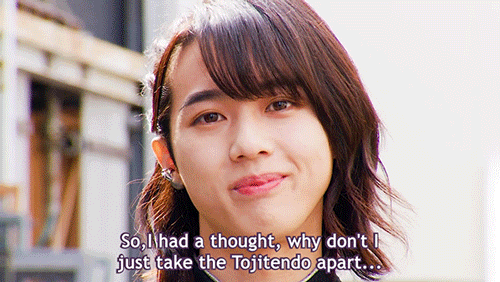
The most noticeable difference at first is that Stacey is smiling, which is very out of character for him. He’s also acting unusually flirty and cute. “Is it me or is he extra cutesy today?” one of Kaito’s teammates observes. It’s true. He speaks in a slightly higher register than usual, enunciates words differently, and he keeps tilting his head and slowly blinking at Kaito in a flirty way.
(In an interview with Komagine and Sekoguchi translated by @mirai-e-jump here, Sekoguchi talks about first receiving a script in which he would play God. As his interviewer points out, the stage direction for the script instructed him to read the lines "sweetly." Sekoguchi says that he didn't know what to make of it at first, but it got him thinking about gender presentation and led him to decide to try to portray God in a gender-neutral way.)
In addition to God's flirty, "sweet" manner, Kaito notes that this version of Stacey is too easygoing, too ready to cooperate with others. When God first appears, the villain-of-the-week is called Headwind World. They put a sort of curse on the Zenkaigers that makes it so that no matter which direction they turn, they're always buffeted by a strong headwind. Discussing how different Stacey seems and his claim to want to join the team, Kaito says:
Maybe....If it’s the truth, I’ll be full power* happy! But something seems off to me....Whenever I’ve talked to Stacey, he was never like that. He tends to be more…sorta…Yeah! He’s a lot like this headwind! *Kaito's catchphrase is "zenryoku zenkai," which means "full power" or "full throttle" and is the source of the Zenkaiger's team name.
God-in-Stacey's-body makes things too easy. Trying to work with the real Stacey is like walking against the wind. And as challenging as that is, Kaito would rather work with the real Stacey than this flirty, easygoing impostor.
Later in the episode, when they fight side-by-side against Barashitara, “Stacey” seems to find him entertaining. The real Stacey could never find humor in the things Barashitara does. After all, he’s his abusive father and probably murdered his mother. After this fight, “Stacey” suggests that everyone should trust him now that he’s demonstrated his willingness to fight on their side. Kaito responds:
I still don’t get it. You’re not the Stacey I know. If Stacey was fighting Barashitara, he wouldn’t have been like that. He’d be more prickly and less compromising. He’d say stuff like “Stay out of this!” or “This is my battle!” Stacey’s feelings toward Barashitara aren’t like that.
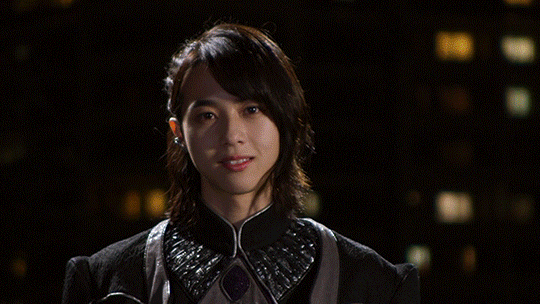
“Stacey” tries to play it off, but is clearly frustrated by his skepticism. But Kaito doesn’t waver. His facial expressions and body language in this scene are really noteworthy. His face looks stern. He looks at Stacey fixedly, seldom blinking, and his hands are balled up into fists at his sides. This is really out of the ordinary for him—he's typically friendly to a fault. It's unusual for him to even look this way at an enemy. But it won't be the last time his affect looks this way around God.
Kaito is the first to realize that this person who appears to be Stacey isn’t really him. Explaining to others—both his teammates and God themselves—how he knew this gives him an opportunity to show the audience how well he knows Stacey, how much he has observed about his personality. But that’s not the only way in which the theme of being seen shows up.
One of the ways Kaito sees Stacey authentically is by noticing and acknowledging his deeply painful experiences with trauma and loss. Despite pressures to the contrary, Stacey eventually does the same for Kaito.
Stacey goes through quite a process to get to the point where he can acknowledge that Kaito has had his own difficult history and continues to struggle in ways he can relate to. When he first meets Kaito, he fights him but claims it’s “nothing personal"—but that changes quickly. The second time they interact, they have a conversation in which Kaito wrongly assumes that Barashitara is helping Stacey and that he's doing so out of parental concern. Naturally, given how far this is from the truth, this is makes Stacey extremely angry. He retaliates by needling Kaito about his missing parents. He mentions the possibility that, given their apparent involvement with the Tojitendo, they could be “lying dead in a ditch somewhere, just like [his] mother.” Then he decides to twist the knife a bit more. “Maybe they weren’t kidnapped, but they abandoned you! Like Barashitara did to me.”
Kaito responds by passionately defending his parents and insisting that they would never do that to him. Kaito's faith in his parents infuriates Stacey. He feels envious and bitter because the only parent he could believe in is long dead and his father was never worthy of his trust. Kaito’s defense of his parents pushes all of these buttons and more and Stacey becomes enraged. He tells Kaito that fighting him is no longer “nothing personal.”
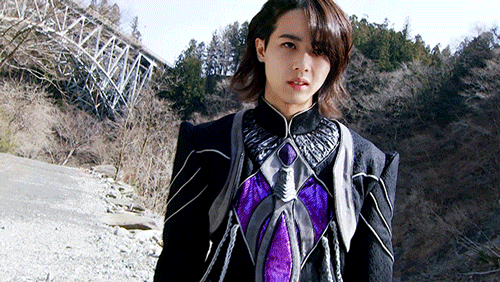
Later in the series, the shift in how they relate to each other is both illustrated and deepened when Bon World (a villain-of-the-week based on a Japanese holiday) becomes the latest adversary to try to take over Zenkaitopia. Bon World causes characters’ ancestors to return from the dead to visit them. Stacey gets a particularly surprising and poignant visit from his mother, Lise. At first he doesn’t trust that she really is who she purports to be, but eventually he’s convinced. He gets to spend a little bit of time with her after their years apart.
But like a lot of the Worlds the Zenkaigers fight, Bon World’s powers have a two-step effect. First, they bring back ancestors. After a while, these ancestors snap and start going after their descendants, trying to kill them—including Stacey’s mother.
When the ancestors manifested by Bon World start to turn homicidal, the Zenkaigers have their hands full. Zyuran’s great-grandfather turns on him at the same time the Goldtsuikers are attacked by their grandfather. Kaito’s friends need him! But he leaves, trusting them to handle the situation themselves, so that he can come to Stacey’s aid. Why? Because he has a realization during their fight. One of the people he has to battle is Hakaiser, a Tojitendo “experimental soldier” who Kaito has recently learned is actually his brainwashed and physically altered father, Goshikida Isao. He tells Hakaiser he understands why it’s so upsetting for the others to have to fight their ancestors because he’s being forced to fight his own dad. This causes him to remember that one of the returned ancestors was Stacey’s mother. He asks Hakaiser where Stacey is and they both rush to his aid (with Kaito in Super Zenkaiser mode).

After he comes to Stacey’s rescue, the rest of the Zenkaigers defeat Bon World and the ancestors all disappear. Stacey asks Kaito why he would come to his rescue. After all, they’re enemies. Kaito tells him, “I knew that you and your mom would both hate this happening.” Here’s what I think he means. It’s obviously a bad thing to be visited by an ancestor who tries to kill you. That was true for everyone who had that experience because of Bon World. But for Stacey, seeing his mother again and then having her attack him involved a whole other level of pain and trauma. It was deeply triggering and a terrible insult not only to Stacey’s memory of his mother but also his mother’s love for him. Kaito could see this from Stacey’s perspective as well as Lise’s. For Kaito, this meant that this particular instance of an ancestor attacking someone was a bigger deal than the others and required a more urgent response. But it wouldn’t have been quite so urgent if it weren't for the fact that Stacey means something to Kaito.
Stacey is profoundly touched by Kaito’s actions and what he told him about his reasons for helping him. This moment ends up being a big turning point in their relationship. This isn’t just because Kaito helped Stacey (though he did) or because he was kind to him (though he was). It’s also because Kaito showed a remarkable degree of sensitivity and understanding in realizing what this experience meant for Stacey. He showed that he paid close attention to things he had learned from and about Stacey, viewed those things as important, and took them into account. I think it’s also clear that as someone whose parents disappeared when he was a kid, Kaito has a better understanding of the loss Stacey has experienced than other people would. And of course, it matters that Kaito prioritized helping Stacey even though his teammates and allies were facing similar challenges.
Stacey ends up keeping Kaito’s experiences in mind and acting on them in a similar way. The biggest example of this is his decision to stand aside while Kaito deprograms his father, Hakaiser/Goshikida Isao. Hakaiser had been Stacey's friend prior to that point, something exceedingly rare in his experience. In fact, Hakaiser may well be the first friend Stacey has ever had. It helps that despite his brainwashing, Hakaiser retains a lot of Goshikida Isao’s warm, optimistic, Kaito-esque personality. Hakaiser quickly becomes really important to Stacey. So when he learns that Hakaiser is really Goshikida Isao, he feels conflicted because his concern for both Kaito and Yatsude pulls him in one direction while his desire to keep his friend pulls him in the other. At first, Stacey turns his back on the Goshikidas in favor of keeping Hakaiser in his life. But once Kaito protects him from his mother's ghost, Stacey can’t keep that up for long. And he doesn't just stand aside during the Zenkaiger's deprogramming efforts. He also leaks data to the Goldtsuikers that helps the team to safely extricate Hakaiser from a giant mecha superweapon he’s controlling (without which the team would have been forced to either endanger Isao or risk countless human beings getting hurt or killed). Naturally, this also means helping the good guys to take the giant mecha out of commission—a blatant act of treason against the Tojitendo.
Stacey doesn’t say much about why he decides to let Goshikida Isao go. But he makes it clear that he sees how unjust and hypocritical it would be to keep Hakaiser around at Kaito’s expense while decrying the way his father took his mother away from him. It's also apparent that the bond he's formed with Yatsude and Kaito plays a role.
To go from resenting Kaito's faith in his parents to helping Kaito get his father back involves a lot of growth. Just as earlier, the differences in their respective situations angered Stacey, the similarities between them eventually lead him to shift toward helping Kaito rather than hurting him.
Now I'm going to circle back to the possession storyline to talk about some of its other implications.
The possession storyline allows Kaito to show how much he values consent and bodily autonomy—particularly Stacey's.
Remember how Kaito suspected immediately that the possessed version of Stacey wasn’t really him? An episode and change later, Kaito and the rest of the Sentai finally find out that Stacey is being possessed by God. Kaito doesn’t say much about this when it's first revealed to him, but his eyes are glued to God-in-Stacey’s-body and he turns stone-faced again. He remains like this for the rest of their conversation, while God aims more head-tilting and slow-blinking his way.
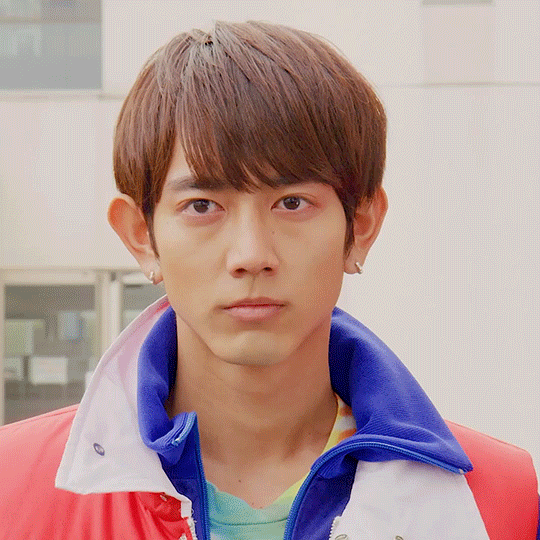

The next time they confer with the Zenkaigers, God is in a hurry to get them to agree to work together. But Kaito says there’s something else he needs them to address before that can happen. He asks God what happens to Stacey when they’re possessing his body. Their answer is disturbingly flippant: “His consciousness takes a little nap.” Then he asks God if they have Stacey’s consent to do this. “Do I really need it? When I’m a God?” they ask contemptuously. That’s when Kaito tells them that he can’t trust someone who would use another person's body without their permission, so they won’t be able to work together—unless God sets Stacey free. He offers to let God possess him instead in order to communicate with the group, and the other Zenkaigers chime in to say they’ll volunteer as well. God agrees to this and leaves Stacey’s body for the last time.
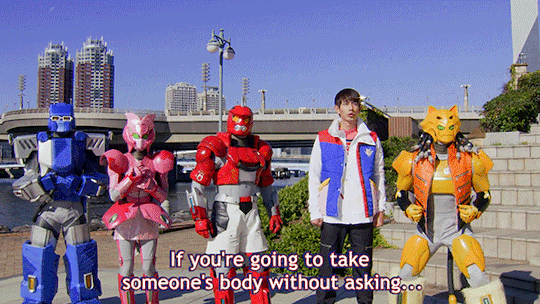
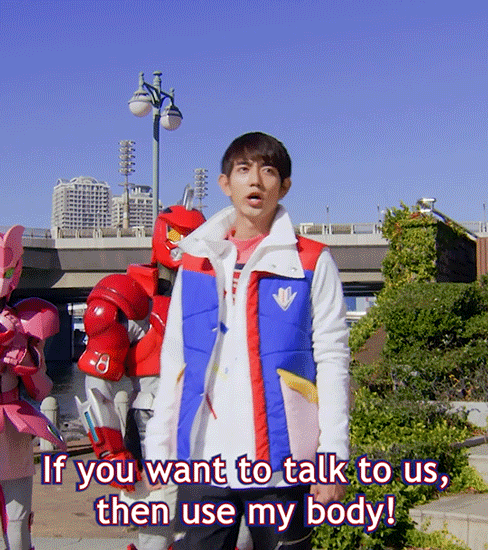
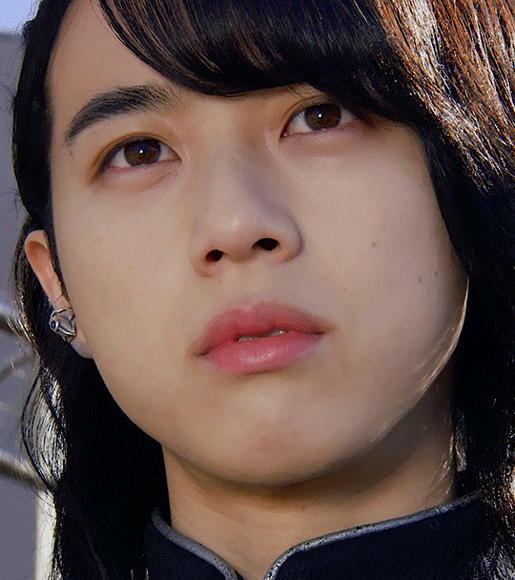
Consent isn’t a common theme in tokusatsu, at least not in any of the shows I’ve seen so far. I don’t know of another toku show that's had an entirely analogous possession story, but it’s not uncommon to see some kind of variation on this theme. Ankh from Kamen Rider OOO is an ancient supernatural being who possesses the body of a random young man on the verge of death, Ryotaro from Kamen Rider Den-O is possessed by a whole cadre of beings from the future at different points in the series, Wataru from Kamen Rider Kiva is briefly possessed by his own father, Otoya, and I have no doubt that there are other examples I'm not thinking of or just haven't come across yet. I've seen the moral implications of possession get some degree of attention in these shows, but I’ve never seen consent foregrounded in this way. (That said, I haven’t seen the entirety of either Den-O or OOO, and there are plenty of other series I haven’t seen, so there may well be examples I’m not aware of.)
It helps that consent doesn’t just come up in an implied way, in the background, or on its own. Instead, Kaito brings it up specifically and intentionally. The plot is racing along toward the climax of the series at this point. It would be easier for Kaito to allow God to continue to gloss over the question of Stacey’s consent. It certainly would have been easier for Komura Junko, the show's screenwriter, to skip over this question. She could have just used God as her story’s deus ex machina (no pun intended) without exploring the deeper implications.
It’s fitting that Kaito’s insistence on Stacey’s consent comes up in the form of an interruption that stops the forward momentum of the story, because when people are ignoring important consent issues and someone has to speak up about it, it’s often seen as an unwelcome interruption of things that are viewed as more important. Bringing up consent in those situations means bringing other matters to a halt and raising uncomfortable topics that others have tacitly agreed to ignore. As with so many important issues that we need to speak up about in our daily lives, raising the subject of consent is often intensely awkward. When Kaito brings it up, God is surprised and clearly put out, and it means the story has to take a detour before the Zenkaigers can defeat Bokkowaus with God’s help. Kaito doesn’t let any of this stop him, though. He understands how important it is. Even though collaborating with God is by far the best chance the Zenkaigers have of overthrowing Bokkowaus and saving the multiverse, he holds fast and insists that he’ll only work with God if they stop possessing Stacey without his consent.
It's worth noting another context in which consent comes up in the series, and that is the portrayal of Stacey's late mother, Lise, and her relationship with his father, Barashitara. Lise was Barashitara's 893rd "wife." I'm using scare quotes here because while we don't know the details of how Lise ended up tied to Barashitara and bearing his child, there's no particular reason to believe she consented to the relationship and a number of indications that she didn't. When she appears again in ghost form, he refers to her having always been "feisty," which seems like code for "didn't just let me do whatever I wanted without any resistance." She, on the other hand, seems to hold him in contempt. In Komura Junko's current series, Kamen Rider Gavv, the protagonist's human mother is kept prisoner by a non-human father who refers to her as if they're in a relationship despite her protests that she never sought or consented to a relationship with him. This seems like a more explicit version of what was implied about Stacey's mother in Zenkaiger.
Stacey obviously has strong feelings about the way his mother was treated. When Barashitara reaches for her, commenting on how he's never been with a ghost before (and implying he'd be up for changing that), Stacey hurries over to pull his hand off of her and rushes her out of the room after yelling at Barashitara to keep his hands off of her. Again, Stacey's human mother and Kikainoid father could have been used as a plot device without digging any deeper into the nature of their relationship, but this series not only doesn't avoid the subject, it makes a point of commenting on it.
The themes of consent and seeing/being seen end up working together in a way that undercuts the ship in some superficial respects but ends up emphasizing what really makes it special.
I mentioned earlier how one of the first clues that God isn’t really Stacey is their facial expressions, speech, and other ways of communicating with others. Well, they continue smiling, speaking in a cutesy voice, and doing flirty mannerisms—and the biggest recipient of these gestures is Kaito. They also call Kaito by his given name, something Stacey doesn't do until the series' penultimate episode. When you add it all together, they’re pretty clearly flirting with him.
Some stories would take this as an opportunity to develop the ship between Kaito and Stacey. If God-in-Stacey’s-body flirts with Kaito, you could easily arrange things so that this helps him recognize or develop an attraction to Stacey that continues when the possession has ended. (It’s certainly been done before in other shows.) Any possession or body swap story is going to be partly about contrasts—that’s a big part of their purpose—but they can still foment changes that continue when everyone gets their own bodies back. Basically, if Stacey is too conflicted to flirt with Kaito, well, God can do it for him. It works in the other direction, too. If there are things Kaito would do with Stacey if he weren’t so considerate of his feelings, if someone else is walking around in his body, suddenly different possibilities appear. (And yes, I think some version of all these possibilities could be done even if the ship remained at a subtext level.)
There’s just one problem: Kaito may not figure out for certain that God isn’t Stacey right away, but within moments of meeting them, he’s 95% there. They can’t make him see Stacey in a different way if he doesn’t believe they’re him at least for a while. He isn't even open to relating to them in a positive way. It really is remarkable just how unfriendly he is to God-in-Stacey’s-body considering how friendly he always is to almost everyone else. And when they flirt with him? He’s not into it in the slightest. In fact, it just pisses him off.
Another thing about possession stories is that they can be a way for writers to cheat to get characters—well, close facsimiles of them who are mistaken for them by other characters—to do things they couldn’t justify otherwise. But Kaito refuses to let this happen. He gets suspicious of God almost as soon as they show up, he begins to grow hostile toward them even before he has fully processed the truth about their identity, and once he’s had a chance to think about the situation, he takes his next opportunity to refuse to work with God unless they set Stacey free as soon as possible.
By having the hero of the story behave in this way, Zenkaiger prioritizes consent and, by extension, the individual right to bodily autonomy. It prioritizes consent over ship advancement, over plot advancement, even over getting the danged heroes into the evil overlord’s castle so they can have their big showdown. There are moments where it’s on the verge of becoming annoying. As TV viewers, especially if we’re habitual tokusatsu watchers, we’re pretty used to possession plotlines of this type. When they start making things happen, we get caught up in escalating events. Having someone like Kaito suddenly show up and say, “Wait a second, is Stacey OK with this?” feels like a weirdly abrupt interruption.
It reminds me a bit of something Kathleen Hanna from the band Bikini Kill says in The Punk Singer, a documentary about her life. She says that speaking out about sexual violence often results in a "who farted" moment—one in which a group is collectively uncomfortable and looking for someone to blame, generally the person who mentioned a taboo subject like sexual violence.
Kaito fearlessly embraces a “who farted” moment when he asks about Stacey’s consent or lack thereof. Of course he does—that’s who he is. A principled, morally rigorous guy who would rather be cringe as fuck than hurt someone unnecessarily. It’s no wonder he’s able to turn the “demon prince of the Tojitendo” to the side of good…and even get him to write him love letters.
In other words, by refusing to exploit the possession storyline for a cheap version of ship development, Komura Junko develops the Kaito x Stacey ship even more, and more meaningfully.
Could this storyline have been written by the typical cishet dude tokusatsu screenwriter?
It seems noteworthy that this choice was made by one of the few women to have held a head writer position on a toku series. Of course, women are not the only people who care about consent and bodily autonomy, just as they aren't the only people who are subjected to their bodily autonomy being compromised and their right to refuse consent ignored. But women, people who are perceived as women, and men who don't fit into a normative cishet image are more likely to have such experiences than cishet men and thus more likely to find such themes salient, so it would make sense if a woman writer was more likely to include them in a series than the (ostensibly) cishet men who make up the vast majority of tokusatsu screenwriters.
I would argue that the importance of being authentically seen is also particularly salient for many women and that this may have played into the way Komura weaves that theme into the Kaito and Stacey story. Women and people perceived to be women tend to experience a great deal of objectification, and being authentically seen and acknowledged is basically the opposite of objectification.
I recently ran into Martha Nussbaum's typology of objectification for the first time and it turns out that it applies to God's possession of Stacey remarkably well. In the interest of time and length, I'll leave it at that for now, but I'll probably talk about in a separate post at some point. Suffice it to say that God's treatment of Stacey illustrates a number of the facets of objectification Nussbaum lays out. So what does this have to do with the Kaito and Stacey ship? It comes back to my point about how the show presents the possession storyline with all of its potential for ship development and has Kaito refuse to engage with any of it out of concern for Stacey. This makes God a kind of foil for Kaito that gives him the opportunity to show that his interest in Stacey isn't based on objectification.
(Edited to add: I ended up writing more about this in a post on Nussbaum's concept of fungibility as objectification, with the Zenkaiger possession storyline as an example.)
So there you have it. There are plenty of reasons to appreciate the Kaito x Stacey ship without digging into issues like these. The characters are interesting, affecting, and fun. Their personalities fit together in a classic cinnamon roll/tsundere way. The actors have great chemistry with each other. But the way the story treats these concerns, which I contend is colored by the different perspective Komura Junko brings to toku based on her gender, is part of what makes it particularly special.
#kikai sentai zenkaiger#zenkaiger#stacey#stacey zenkaiger#sekoguchi ryo#ryo sekoguchi#komagine kiita#kiita komagine#stacy#suteishi#goshikida kaito#kaito goshikida#kaito x stacey#komura junko#tokusatsu meta#zenkaiger is a BL
60 notes
·
View notes
Note
If you could change/rewrite any UA Teachers, what would you change? Would you change their Quirks?
For the sake of this, I'll focus on first part of your question. I do not for the life of me understand changing their Quirks and what the point of that would be. And I'll be focusing on the teachers as a whole rather then just individuals like Nemuri or Nezu.

The ultimate issue with the other teachers is that they just aren't given anything to do. They are there to fill out the rest of the roster and look cool while doing it. The more relevance they have is when it comes time to fight the other kids during exams. I understand they aren't the main focus. All of that is given to Aizawa and All Might. And I like Aizawa and All Might, and I understand their importance to the series in this context. It's just that the take up so much air space in the school scenes. Or at least, we aren't given any school scenes with out them and the teachers. I could simply have these characters replace these two, but I don't thinking taking something from another character would be helpful. However, I do think there are ways to improve them without taking up too much space.
I think this could easily be remedied by just giving the teachers more stuff to do. Namely, by actually being teachers. Now, this could just be showing them in specific roles. Heck, Hound Dog is supposed to be the student consular and you could easily done some scenes with him and the other students given everything they've been through. However, I think there could be more done in them teaching actual skills related hero work. We see something like this when Nemuri teachers the other kids how to handle themselves in interviews. Have Present Mic teach them about media and how it affects hero work, have Recovery Girl teach them first aid, get Nezu to teach them tactics. This can help give us more insight to the teachers, give us a peek into the world at large through the lessons, and can work as down time between all of the bigger events in the series.
And this can be something that goes beyond the class room. Have the teachers instruct certain students. Like what if after the exams, some of the students went to the teacher they fought and asked for their help to learn how to cover up their weaknesses. Alternatively, just work with a teacher with a similar power. For example, Mina could learn a lot from Vlad King on controlling her power. That would be a great way to solve several issues at once. It gives a chance for the students to learn from their mistakes, potentially give more unique ways for the students to grow as fighters and character. It would help build more character for the teachers, and give use greater insight into them. Could this be done better by changing some of their Quirks to better fit with the students? Maybe, but I think you could still find someway for the teachers to help train certain students.
#My Hero Academia#Not Quirks#Toshinori Yagi#All Might#Shota Aizawa#Eraserhead#Hizashi Yamada#Present Mic#Nemuri Kayama#Midnight#Sekijirou Ken#Vlad King#Ryo Inui#Hound#Chiyo Shuzenji#Recovery Girl#Nezu#MHA Meta#MHA Theory
58 notes
·
View notes
Text
The Canonicity of the Digimon Wonderswan Games

I am right now a bit back into my old Digimon hyperfixation I am afraid. So let me nerd out a bit more about it, or in this case rant about another thing.
See, I am in a bit of a weird position in regards of this fandom. I am from Germany, where we got the dub names and stuff, but the Japanese cut of the anime. But also, I switched to watching the sub already by the time Digimon Tamers was starting to air in Japan, and had fairly easy access to most of the Japanese media for the franchise through the magic of the internet.
As such I grew up with the Japanese stuff for Digimon in the most part. Including the Wonderswan games, that are kinda legendary in the west. And man, let me tell you: I love those games. They are not really good games, I would argue. Like the game mechanics are just not very polished, and like in a lot of Japanese games at the time you needed to grind quite a lot. But I loved the story and the way it was portrayed. And I adore the game version of Ryou. He is my cute baby boy, who needs a serious hug.
However... Something that I have already been annoyed with was the fact that a lot of western fandom has always seen these games as canon. And I kinda get why - at least in regards to Adventure/02 - given that Ryou gets referenced in the canon a lot. It is canon that Ryou exists in this universe, as well as Millenniumon. And it is canon that Ken and Ryou travelled through the digital world. However... The game as it is, is in fact not canon and never was meant to be. This is because games very much contradict several aspects of the primary canon (the show). Let us go through those things, okay?
Anode/Cathode Tamer
This game takes place on New Years Eve 1999, so about 4 (or really 5) months after Digimon Adventure. Millenniumon, a Digimon that has been formed when the data of the defeated Machinedramon fused with a Chimeramon, messed up the digital world and brought back the villains the Chosen Children had already defeated. Being brought back, they kidnap the Chosen children. Agumon turns to a human child - Ryou Akiyama - as he needs a human to evolve. So, Ryou on his own has to fight through the villains of Digimon Adventure to free the chosen children. He is not a Chosen Child himself, though, being made to borrow Taichi's Digivice.
Now, this game is clearly not canon - the villains being brought back is never mentioned again, and it is explicitly said that spring 2000 was the first time that the Chosen Children returned back to the Digital World after their original adventure.
Other than that... I kinda love how vile the villains are in this game. I really adore it. But yeah, definitely not canon.
Tag Tamers
Tag Tamers starts during the events of the second movie. Diaboromon is defeated and just as this happens, Ryou and Ken get contacted by V-mon and Piccolomon. Millenniumon is back, and it is up to Ryou to defeat it. This time he has to partner up with V-mon, who is already destined to be Daisuke's partner. So Ryou and Ken go visit the digital world together - only to find out, that it was all a trap set up by Millenniumon to lure Ryou back.
This game at once is the one most directly referenced in the Show (with Ken's flashback to getting infected with the Dark Spore) and also the more most directly contradicted by the show. Because while the game takes place in March 2000, the series explicitly names the time of Ken and hence Ryou travelling to the digital world as August 2000, exactly a year post-Adventure. More interestingly we do not see any partner with Ryou in the flashback either, and it is pretty clear that if V-mon ever met Ken or Ryou before, he does most certainly not remember.
It should also be noted that in this game Ken and Ryou both get D-3 Digivices, while in the primary canon Ken obviously received a normal Digivice at this point, that only later turned into the D-3 at the Dark Ocean.
D-1 Tamers
D-1 Tamers takes place not too long after Tag Tamers. While watching over Ken, who is sick from the Dark Spore, Ryou finds an online quiz about Digimon and upon answering it gets once more summoned to the Digital World. Here, he is made to participate in the D-1 Tournament against other Children and their Digimon partners, including both characters from the anime and some original characters. However, soon enough it turns out, that the tournament was just something created by the Holy Beasts to train Ryou up to once more fight against Millenniumon.
Basically, the same from before applies. The kids in this game all have D-3 Digivices, that did not yet exist in this universe. Nowhere in canon is it ever mentioned that Taichi and Co. have travelled back to the Digital World at this point - and mind you, the entire thing with the Holy Beasts also does not make a whole lot of sense considering the canon of the show (with the Holy Beasts just being brought back).
As someone who tends to latch onto minor characters very easily, I loved the original characters in this game, even though they have very few lines.
Mind you, if you have been in Digimon fandom spaces for a longer time, you might have come across the picture underneath before and thought to yourself: "Oh, this looks official." However... It is actually Fanart. To be exact this picture seems to originate with a fan-book on the games called Digimon Crusader. (I have been trying to get my hands on that one before. But I have only seen it two times up for auction and never could get manage to set up a proxy in time - as the sellers were never shipping to Europe.)

This is the book by the way:

Brave Tamer
Lastly there is Brave Tamer, a game that is rather hard to describe, because it involves a ton of time travel. Hurray, because this plot was not already convoluted enough. lol
Basically, it starts with Ryou at the very beginning of the Digital World, meeting Monodramon and then timehopping a whole lot to help both the Chosen Children and Tamers (who also show up here, because the game released by the time Tamers was out), and also get some closure. Please note, at this point in time the digital world has fucked up Ryou's mental health for good. lol
The game ends with Monodramon forcing a fusion between himself and Millenniumon, defeating the villain like this and leaving Ryou out of time with a single Digitama.
The plot of this game, due to the time travel, is a whole mess. I adore the game for the worldbuilding it does for the Adventure digital world, even though this, too, is doubtful in terms of canonicity. There is no real harm to take this as canon for the Adventure-world, though obviously the show itself contradicts this in terms of canon for the Tamers-world.
The crossover stuff between Tamers and Adventure verse is also very confusing to say the least. But yeah, given that none of the interactions here ever get referenced anywhere: This is also very certainly not canon. (Also, for some reason Ryou aged 2 years between D-1 Tamers and Brave Tamer, even though Brave Tamer starts up very shortly after D-1 Tamers ends.)
So, what is canon?
All of this might leave you wondering: What is canon for Ryou? Well, it is kinda hard to say. What we can assume is something like this:
In the universe of Digimon Adventure there is or was a boy named Akiyama Ryou. We do not know a whole lot about him, but based on his design he was probably 10 or 11 years old in August of 2000. When Ken first got called into the Digital World, he met Ryou there, and the two of them defeated Millenniumon, getting Ken infected with the Dark Spore. We do not know what happened to Ryou after this, but it seems unlikely that he and Ken stayed in contact, given Ken never brings him up. It is not impossible that he has died, though this is never confirmed, or contradicted by the canon.
In the universe of Digimon Tamers, there also exists a boy named Akiyama Ryou. Other than the boy from the games, he is not from Tokyo, but from a fishing village near Kitakyushu. We do not know whether he has a mother, but he has a father, as well as an uncle who lives in Tokyo. Whenever Ryou participated in the Digimon tournaments, he stayed with his uncle, apparently. In December 2000, Ryou meets Cyberdramon in Tokyo, and realized that Cyberdramon cannot stay in the real world because it is too aggressive. So he decides to travel to the Digital World together with it. Now, technically you can argue whether Cyberdramon is the Digimon resulting from the fusion of Monodramon and Millenniumon, but Ryou is very much a different character with a different backstory.
(And mind you: No, that US Comic that marries the Digimon Tamers story with some of the game story, is very much not canon, like all US-only material.)
#digimon#digimon adventure#digimon adventure 02#digimon tamers#digimon anode tamer#digimon d-1 tamers#digimon brave tamer#ryo akiyama#akiyama ryou#canon#digimon meta#text post#long post
26 notes
·
View notes
Text
We have to talk about Shin Devilman.
Shin Devilman was printed out in 1979-1980, so nearly a decade after Devilman's initial run between 1972-1973.

At this point in time, it seems Nagai was closing in on the stuff that he made up mid-serialization, in an effort to strengthen certain character attributes that were not present in the original manga, or were present only by accident. For example, I can't recall Ryo being called 'pretty' in the manga, while in this comic, it seems that he's fullfilling the trope of 'phyiscally weaker pretty boy', if only in contrast to Akira. That said, I'm also curious as to if fangirl activity was picking up, and will, in this text, argue the idea that Shin Devilman was at least in part drawn for a female audience.
Exhibit A: Two Boys, Clinging.


Look at the clingy. _the clingy_. (I personally enjoy Ryo topping, but I definitely see why people draw him on the bottom most of the time...) Exhibit B, Nudity & Cleavage aka al the Stripperiffic outfits worn by the boys.







Exhibit C: Ryo is shown as male.

This page is interesting, because it confirms Ryo as not being interested in women, implying that for all satan's hermafroditism, Ryo Asuka is likely a gay boy. Of note is also the fact that Satan, aka 'Ryo with tits' does not show up in this manga, to my understanding. And I can see why, straight women would likely not be very interested in that. Exhibit D: The Ending


The story ends with Ryo walking away from Akira, implying that their relationship has changed. Despite having shown Miki's relationship with Akira just minutes earlier, the story ends with Ryo and Akira. Again, notably, Ryo, not Satan.
Final conclusion: This work focuses on Ryo and Akira's relationship, as well as presenting them with desirable bodies that are repeatedly shown off. Further, the manga goes out of it's way to show images that would be presumed as appealing to a female, heterosexual audience, in relation to Ryo's 'true form', by focusing on his human form (and the attractiveness of such).
35 notes
·
View notes
Text
The Visual Symbolism of the True Route: Mirror symbolism
There's a lot of visual symbolism in the true route but one of the prominent symbols that stands out the most is the use of mirrors. It was talked about before in a post on Tumblr by someone but here I wanted to elaborate on it
This post will primarily focus on the original Japanese version of the game, not the Jast localization. Since it did the game dirty I wanted to go over the true context by looking at the Japanese version.
This post will cover the true route to those who haven’t played the game; a spoiler warning is now in effect.
Mirror
First, before we begin I want to talk about Mirrors in general and how they are used. The main purpose of mirrors is to show your appearance.
In a fictional sense, the mirror is used as a literary device to show your true self, mirrors show the reflection of ourselves and reflect our flaws and imperfections, the worst parts of ourselves we don’t like to look at. the mirror can reflect all the terrible aspects we don’t like about ourselves.
Literature uses this to highlight the similarities in characters which is used to reflect the theme “Equals” in Towa and Fujieda.
Towa and Maya
Going over mirror symbolism in the route the first ones to discuss are Towa and Maya.
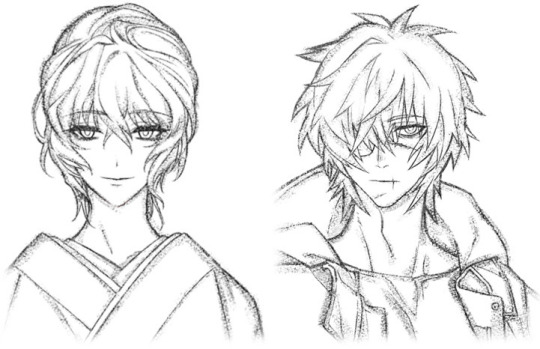
Without a doubt Towa looks exactly like his mother, Towa got most of his appearance from Maya he's the spitting image of his mother many characters point out the resemblance and their claims are not unfounded if you put Towa and Maya together it's like looking at a mirror but it is not limited by their appearances.
Maya runs a store called Euphoria, the name that Towa would later take to use as his artist name. The store is a cabinet club for the wealthy but in reality, it is an establishment meant to fulfill the most twisted desires of man this is similar to what Towa does in his euphoria art sessions.
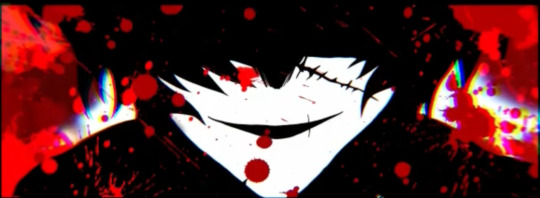
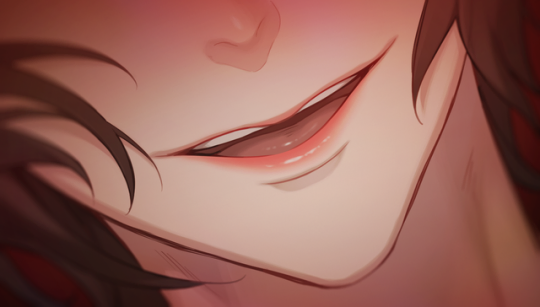
There is a scene in the opening song of Slow Damage when Towa smiles, when you compare the smile that Towa gives it resembles the one that Maya gave, Towa's smile looks like Maya when she was smiling. This is made to point out how much Maya influences Towa’s actions which is seen in the game.
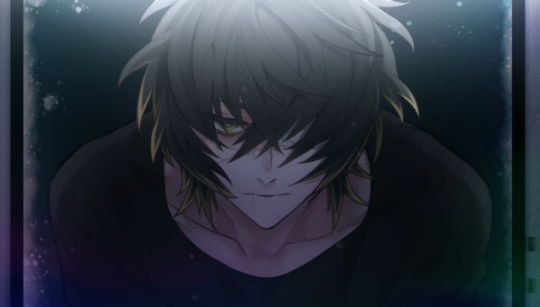
When Towa’s resemblance to Maya in the Fujieda route is pointed out Towa shatters the mirror in his room because he is disgusted that he looks like the monster who ruined his life he attempts to hurt himself to scar his face to further reduce the resemblance it shows just how much this Towa fears Maya once he begins to remember her. Towa is afraid and hates his mother even hates the idea of inheriting her appearance because it is associated with his abuser. Towa sees himself as a copy of Maya not only because of his appearance but how his euphoria art sessions are similar to what Maya did.
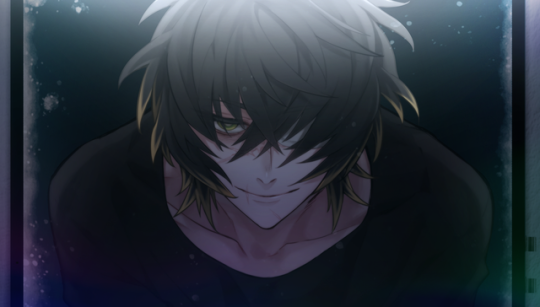
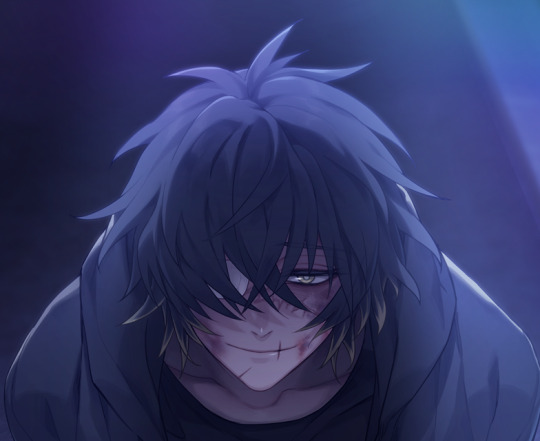
The CG where Towa impersonates Maya to trick Sakaki mirrors that scene of Towa standing in front of the mirror even the position Towa in the CG is similar to the CG of Towa standing in front of the mirror. This points out that all along Sakaki only ever saw Maya in Towa, not himself this led to him being fooled and to his death.
Towa is viewed as a mirror to Maya by certain people including Maya herself no matter how much Maya can claim she loves her son the truth is Maya views Towa as a version of herself instead of his person she treats Towa as a doll, a toy, not a person that she molds and uses like clay, and is angry that he didn’t conform to her image.
Towa breaking the mirror is a metaphor and a foreshadowing of Towa tricking Sakaki and remaining himself in the good ending and that Towa isn’t Maya but himself. They may resemble each other as mother and son but Maya and Towa themselves are not similar which would get to our next part
Towa and Fujieda

I pointed out in a post that when you put both Towa and Fujieda together they reflect each other like a mirror. Their appearances serve as parallels reflecting off each other like a mirror.
Writing-wise they are similar to each other there are many parallels between Towa and Fujeida both had been abused by their parents resulting in the scars on their bodies, Fujieda's scars came from the abuse he received from his parents, and Towa's scars are made by his customers through his mother's euphoria sessions the abuse caused them to led them to lives of sexual debauchery as a result. Both of them hate their parents and cut off anything that is associated with them.
They both carry scars metaphorically and literally, a metaphor that they have the same pain and trauma.
There was something about the way Fujieda is first introduced to Towa in the game through the routes; his appearances mirror Towa’s state in the routes a post pointed this out before. Fujieda being an enigmatic person in the game to Towa and the audience is parallel to how Towa's past is a mystery to the audience.
There is the visual symbolism of the CGS in the route to analyze, this is seen in the placement of the characters Towa and Fujieda in the CG, in the route has them facing each other like standing in front of a mirror correlating to the mirror symbolism.
For the significance of those CGs:
This happened when both Fujieda and Towa escaped from being shot by the yakuza as they fled from the Takasato group away from the rain Towa and Fujieda fled to his condo and they went into his apartment and changed clothes Fujieda was apprehensive about changing in front of Towa than Towa provokes him in a childish rage Fujieda undresses than after what Towa saw catches him off guard Fujieda had scars littered across his upper torso mirrors how Towa own body appeared. it is the moment when Towa realizes that maybe they aren't so different This scene shows that Fujieda has more than meets the eye
There is visual symbolism sprinkled throughout this CG,
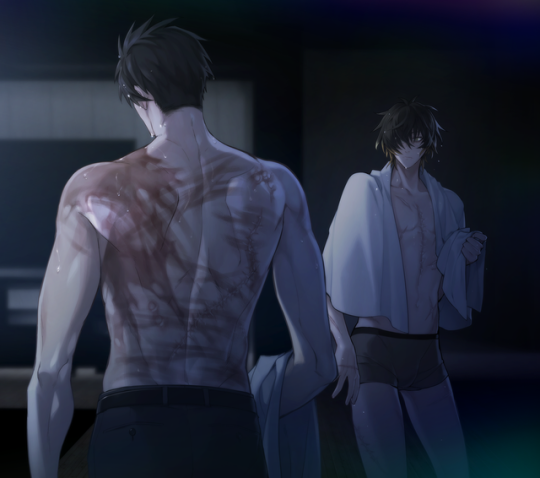
It shows us Fujieda’s back with his entire torso littered with scars Fujieda has his back turned only focusing on Towa’s reactions, it doesn’t show Fujieda's face primarily only focusing on Towa’s expressions. The placement in the CG is both characters facing each other. Both Towa and Fujieda are half naked with scared bodies much like looking at the mirror.
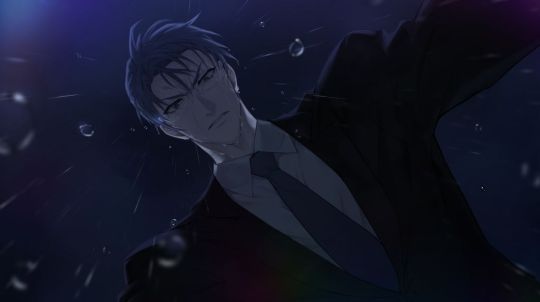
In another scene in the game when Fujieda attacks Towa, Fujieda overcome with sorrow after learning the truth, lashes out at Towa believing that Towa is just as culpable as Maya he is furious that he had no idea that Towa’s a victim of Maya despite Towa being her son. Fujieda is finding a tangible way of getting revenge for Mei. This mirrors how Towa attacked Fujieda in their first meeting in the playground when he is overcome with his PTSD symptoms from remembering the past.
After they visited the ruins of euphoria the trip to the store changed their mindsets leading to this cg the next cg balances hope and despair.
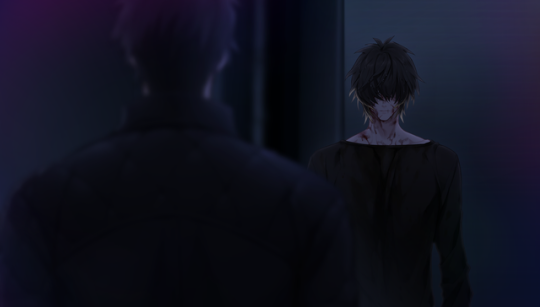
Here Towa is draped in despair after he recovers his memories from the ruins of euphoria he sees no reason to live anymore the pain of what happened to him destroys him from learning the truth about his past He is overcome with survivor's guilt and despair and felt his life isn’t worth living any longer when an innocent life like Mei’s died for his sake.
While Fujieda stands in hope.
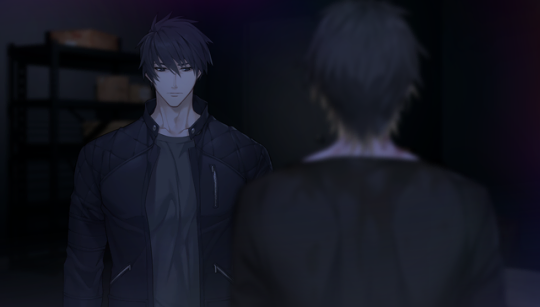
Fujieda talks down Towa from a suicide attempt he doesn’t say simple platitudes about how life will get better or that Towa has so much to live for he acknowledges the pain this information causes him. But Towa’s life is still valuable just as Mei's life was valuable. this is coming from a personal place about Fujieda, Fujieda dealt with suicidal thoughts and hopes to die once his mission to find Mei's fate is complete he didn’t start the route with the confidence to live despite the pain.
Fujieda went through the same thing Towa went through at the beginning of the route. Fujieda is the only person who understands Towa at that moment. visual representation of this during the suicide confrontation reflects off of each other Fujieda is Towa in this scene this further emphasizes that Fujieda is Towa's mirror After their visit Fujieda realizes that Towa was just as hurt as he was and seems to regret his actions he now knows that Towa is a victim of abuse. Towa’s pain is acknowledged.
Fujieda knew that Towa reminded him of himself and deep down knew that this was the very reason why it caused him to repel from Towa due to how similar they are. He reflected all the aspects of Fujieda that he tried to bury deep inside of himself. The reason he doesn’t think Towa reminded Fujieda of himself before is that it would be like admitting that his existence is just as miserable as Towa’s.
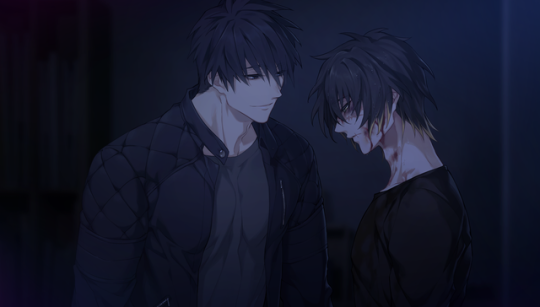
This scene is where Fujieda finally acknowledges their similarities to each other. in the way they are each other's mirror, Towa is Fujieda’s mirror just as Fujieda acts as Towa's mirror
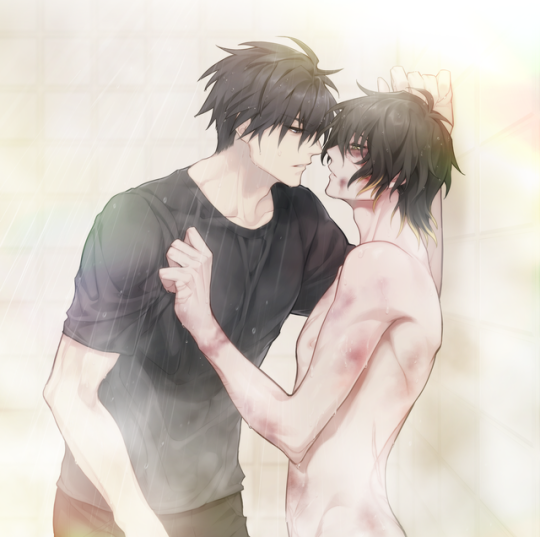
Afterward, In the bathroom, Fujieda and Towa face each other parallels both scenes of Towa standing in front of the mirror shower referencing the rain as a callback to the apartment after they got the rain when Towa first saw Fujieda's scars. Towa requests to see Fujieda's scars wishing to take solace in the sight then to this beautiful CG
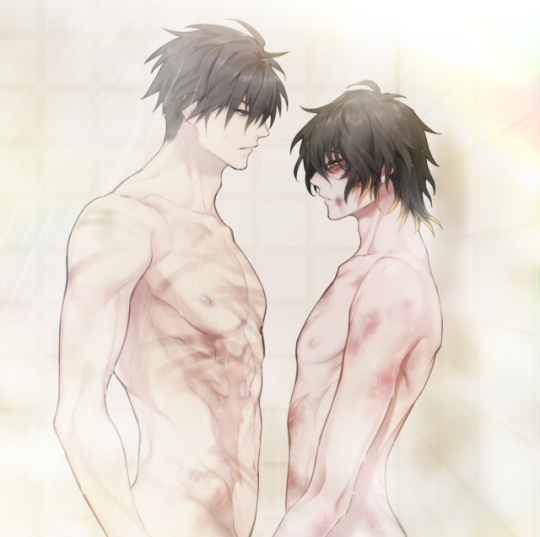
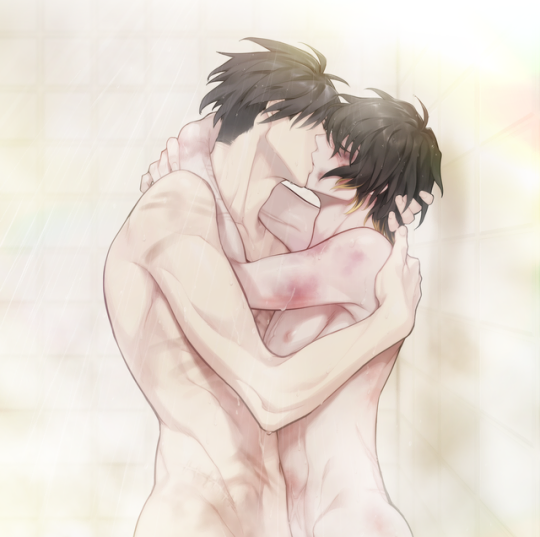
Fujieda and Towa are facing each other naked in the shower covered in scars standing in front of each other this is like looking in a mirror. This shows solidarity and comfort in their similarity
Next to the sex scene. The sex scene is an accumulation of their feelings. Towa feels comfortable being touched by Fujieda. he is overwhelmed to be touched by someone similar to him. In the sex scene, Towa touches Fujieda’s scars Fujieda and Towa understand their pain and trauma. This is about Towa making sure that their pain, trauma, and experiences are on their bodies. It alone was enough if they both understood.
Yeah, he has Taku and Rei but he never finds someone to whom he can relate or even acknowledge his pain. Fujieda understands what Towa has been through in the way Taku and Rei don't. Towa has someone to whom he can relate, and pushes himself to better himself that is why Fujieda is around to help Towa process his trauma to heal from it.
They are similar to each other, yet different, so they're equal.
97 notes
·
View notes
Text
with jjk ending so soon i've gotten even crazier about sukuita lately. i'm desperately hoping/praying that the ending is focused solely on them, since it seems to me all the other characters have gone through their arcs and their stories are pretty much told. i really want yuuji to be the only one who can stop sukuna, either by dying alongside him or somehow merging together with him by becoming his vessel again.
either way, i keep getting reminded of the ending of devilman crybaby.... what if there's a similar ending ahead for sukuna? maybe in his final moments he realizes everything yuuji was trying to teach him, that he really starts feeling love for the first time, right before either he or yuuji dies. just like how in crybaby, ryo/satan is trapped in an eternal cycle of indifference until he meets akira, and only realizes his love for akira at the very end when everything has been completely destroyed.
ryo was so set on destroying humanity and maintaining his own philosophy, just like sukuna is. they're both self-absorbed and completely convinced they're right in everything, but what if the very souls they mocked for being so emotional and too soft (akuna and yuuji) are the very ones who change them, and show them how wrong they were?
sukuna and ryo are both completely heartless and tragic in their own way, and i think that's why people like yuuji and akira eventually got to them... they were the only people who really tried to reach out and understand them, akira by being ryo's friend and yuuji for trying to teach sukuna love.
imo it can only be yuuji who ends this: he and sukuna have been bound together since the very beginning, and only sukuna has gotten to get so close to yuuji - in many ways, not just by sharing his body. yuuji hasn't been so upfront about his childhood to anyone else but sukuna, and i think that's definitely going to sit with the king of curses, no matter what he tries to deny.
even if sukuna can only learn love by having it all taken completely away from him (like ryo) there is still that potential there in him to realize his mistakes and change his hard-set ideas of the world. if a villain like kenjaku/geto can get an ending like gege gave him, then surely sukuna having his own character development for the better isn't so unlikely either.
#sorry if this was written badly... i was a bit rushed with it#i was just going through fics i saved of all the past ships i used to be obsessed with and akiryo started giving me immense sukuita feels#i think there are so many parallels between these two ships and if gege gives sukuna an ending like ryo's...#well i won't be too surprised#anyways! im so interested in what's going to happen next#literally begging for both sukuna and yuuji to go down together#one flesh one end amen#sukuita#jujutsu kaisen#honey posts#meta#devilman crybaby#akiryo#ryokira
49 notes
·
View notes
Text
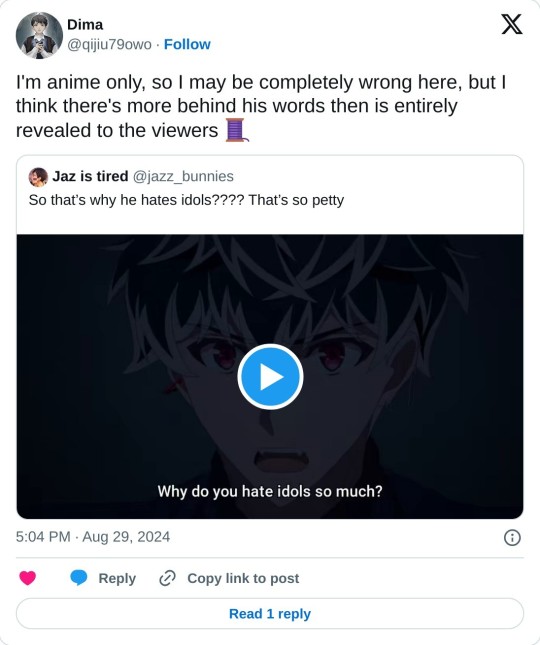



I wrote a thread on Tsukumo Ryou
#braincell posting#tsukumo ryou#ryo tsukumo#ryou tsukumo#idolish7#i7#idolish7 meta#i7 meta#idolish7 analysis#i7 analysis
21 notes
·
View notes
Text
The partnerships of Digimon Survive, part I
A little while ago, a friend sent me this post talking about what the partnerships in the adventure-02 verse reveal about the kids' character and asked me if I'd be interested in writing something like it for Survive. I happily obliged, and this is part one on the subject (as of right now, it's about 60% done and it's at 6432 words, so in the interest of keeping the post readable...)
Spoilers for everything.
CW: Child abuse, since this part contains Shuuji's section.
As explained in this interview on 4gamer, for Digimon Survive, the staff drew from Digimon lore established in Adventure— namely that the partner digimon are “spiritual beings” who are the kids’ one and only partners, part of the kids' own being and responsive to their growth. Generally speaking, Habu and the staff decided on the human characters’ background first and then picked a digimon that fit them so that there would be synergy between their behavior, general storyline and the partnermon’s personality and evolution paths. The one exception to this process being the main character himself, Takuma.
Takuma and Agumon
As revealed in that same interview, Takuma’s partner is Agumon because Agumon is a popular digimon that most fans will accept (60% of players answered they wanted Agumon as a partner in the player survey they conducted asking “Which Digimon would like as a partner?”). Thanks to this popularity, Agumon has a lot of possible evolution paths established that can show the range of the different routes and reflect on Takuma’s status as player character, which makes his behavior flexible and respondent on the player’s decisions. However, it’s also thanks to Agumon being the franchise’s mascot that he’s also got a fairly well defined personality, and Takuma himself is consistently characterized despite his main-character condition.
Generally speaking, Agumon is mostly portrayed as an easy-going and straightforward digimon who wears his heart on his sleeve and is adept at following his instincts into battle. He’s often seen acting on noble and heroic impulses, which might seem to contrast him to Takuma. After all, Takuma is a bit of a wimpy kid who’s constantly fearful during his stay in the kemonogami world; which is quite apparent the moment they meet: even though Koromon is a baby— and thusly exhibits a healthy amount of caution in approaching Takuma— he’s still the one to approach him, much to Takuma’s dismay. This open courage is reinforced through the fact Koromon jumps to the task of protecting Takuma against Gotsumon, despite being very obviously weak.
The apparent gap between the two continues through the game: where Agumon will freely admit his emotions and general ignorance, Takuma appears more withdrawn and thoughtful, always weighing what would be the best thing to say and how the others might react or be feeling. Let’s not forget, however, that the partermon acting as mirrors to the kids might mean that either they’re showing an aspect to their hearts that is not as easily accessible/obvious or show the areas where they have to grow. Both of these aspects are true for Takuma, as he does grow to be braver and willing to face the challenges the world throws at them — this is especially apparent during the ultimate evolution scene for the Truthful route, where he boldly proclaims their desire to fight and save the kemonogami world. Additionally, Agumon has been portrayed as someone with great emotional insight before, which does fit Takuma to a tee. Takuma’s inner monologue evidences how in touch he is with his own emotions and how adept he is at imagining how others must be feeling. Therefore, Takuma’s deeply emotive nature not only shows in his fear-induced paralysis but in his primary function in the group as their caretaker. He looks after the others because he is quite sociable and reasons primarily through emotion, much like Agumon. He doesn’t really investigate the nature of the world intellectually like Shuuji does, nor gets bogged down about fulfilling his duties the way Aoi does, but acts based on his instincts.
Furthermore, Takuma is usually shown unable to propose pragmatic plans, doing better at listening to the others and weighing in based on the mood of the group— this matches Agumon’s own obliviousness and inexperience about the world as well as his naivety. Because Takuma isn’t prone to thinking logically, he often fails to plan ahead and usually only faces things as they come. His go-with-the-flow attitude is best observed during the prologue, and it’s this flexible demeanor what allows him to get along with just about anyone. This can also make him quite naive, as it’s shown when he’s on the fence about believing the Mysterious Woman, unlike the harsh paranoia Kaito exhibits or the reticence from his seniors.
Because Agumon and Takuma are actually so like-minded, Takuma is able to rely on Agumon to sort out his feelings and worries, as seen in the way he asks Agumon for advice in the same way the others do of him. Agumon is able to service him with the unwavering, comforting support Takuma needed to be able to step out of his comfort zone and become bolder. Their philosophical talks show that Takuma is also able to question how to best approach others and his own morality through their partnership (and denying their bond leads Takuma to his most morally bankrupt during the Bad Ending). They’re so in-tune with each other that they’re one of the few pairs that don’t fight during part 6.
Aoi and Labramon
Labramon’s introduction is likely one of Survive’s most comedic bits. Where Aoi shows herself gentle and worried over Minoru’s well-being, Labramon is harsh and downright crude to him. They might be one of the pairs that feel the most “mismatched”, given the fact that Aoi’s speech remains ever polite and friendly contrasts to Labramon not being afraid of speaking rudely and bluntly to others. This gap in speech is subtly bridged in part 5, when we find Aoi’s CD. She talks about liking old rock songs and relays her favorite lyrics to Takuma:
自分の決めた道を行け 邪魔する奴らを蹴散らして
The lyrics feature aggressive and colloquial speech, from the scornful third-person pronoun 奴ら and the quite informally contracted verb form. It’s quite telling it’s a lyric about following one’s path and crushing whoever opposes it. The sentiment and speech feel quite fitting for Labramon, and thus, we’re clued in that her waspish demeanor is a reflection of Aoi’s well-hidden and repressed resentments. Arguably, it’s because Aoi is so reluctant to show her anger or grievances that they fester and Labramon shows them disproportionately. Once she starts becoming more assertive, Labramon earnestly starts showing other of her emotions— as seen in the affinity dialogue in Truthful’s part 10, when the group is saying their goodbyes to depart the amusement park, Labramon wants to relay Aoi’s honest concern for its denizens directly to them. This push for Aoi to express herself openly it's a recurring theme through the talks between them. Additionally, Labramon is more openly meddlesome, affectionate and prideful, which shows the range of emotions Aoi keeps under wraps.
The CD scene is not the only case where their energies match, as we get to see when Aoi gets heated and quells Shuuji and Kaito during their fight in part 4 (and later again, with Kaito, when she wants to handle the toddler digimon at the park). This is also shown when she ardently jumps to Saki's defense against the fake Floramon in part 5. Despite her seemingly docile persona, Aoi is actually quite passionate. This is something we will see expressed more intentionally and consistently (as opposed to her early outbursts) when she grows to embrace this side of herself and her position as their leader, particularly during the Moral Route (Wrathful shows a warped expression of this development since she's not only at her most destructive and wanton— she’s also the least honest she’s ever been: hiding behind machinations, deceit and passive aggression and doggedly maintaining her outer politeness).
Aside from reflecting her desire for aggression and true emotions, Labramon and her evo line also fit to a tee Aoi’s devoted sense of duty. From Labramon’s official profile,we can glean she’s a digimon with a duty. Being an artificial digimon means she was specifically created to fulfill a function, which is further cemented by the fact she’s a literal living vaccine program. Her only skill movement in-game being Cure Liqueur fits Aoi’s own first-aid skills, which are promptly demonstrated when she patches Labramon up in part 1. Dobermon takes this a step further being a digimon whose only purpose is to hunt viruses. This adult stage marks the start of a consistent theme in the evo line about harnessing monstrous power in order to fulfill one’s duties, much like Aoi needs to embrace assertiveness and authority to be able to properly respond to the situations before her and achieve her goals. This is made as textually explicit as it can be during the Cerberumon evo scene, where they remark upon the ferocious shape Aoi’s desires took in this perfect stage, and she openly admits her desire for power— power as having the agency, authority and self-confidence to assert herself—. Cerberumon’s words encourage her not to be afraid of using this latent power already present in herself and to keep a just heart to wield it fairly. Anubimon is the judge of the dark area, who weighs over fallen digimon’s data to either banish them forever or grant them the chance of rebirth. Its role as a fair judge relates to Aoi’s role as a leader who listens to everyone’s input so everyone can reach either a unanimous decision or call for a timeout so the group can put their feelings back in line. Anubimon as a possible endgame for her also foils her corruption arc that leads her to become Plutomon, given both are underlined by the fact she has embraced the authority and power inherent to her social positions and is proactively preserving Harmony, albeit with completely different ethos.
Labramon will consistently encourage Aoi to be more confident and tackle the challenges before her, as her evo scenes and general demeanor evidence. For this reason, Aoi regards Labramon as someone who is as assertive and reliable as she should be, while keeping a really poor opinion of herself. This is at the core of their conflict in part 6, where she worries about what exactly she gives back to Labramon, who's so capable already and has to support her in everything she does. Because Aoi is very stubborn and her beliefs are deeply held, it's difficult for her to internalize the positive feedback Labramon and the others offer her. She admits as much when Takuma mediates between the two, and she promises to work on her inner monologue to be able to treat herself as kindly as Labramon does. This open-ended journey for her to deal with her self-loathing plays a big role in her endgames. Where in Moral she's able to trust the group and delegate —thus managing her workload and stress— ultimately getting the support she needs on her ever on-going journey to assertiveness, in Wrathful she becomes consumed by her self-loathing. So much so, her desires to become a better version of herself and her view of Labramon as the better half are crystallized into becoming Plutomon (think of her dialogue when she explains who she is now: "Aoi? No, I've cast off that weak persona. I'm Plutomon."). Arguably, Labramon being utterly loyal and devoted to Aoi to the point she'd sacrifice herself for her—and the Biomerge only featuring Aoi's voice, signifying Labramon has been consumed— also show the toxic pitfalls of Aoi's scrupulous work ethic. In this way, Labramon and the different outcomes of her evolution line perfectly encapsulate Aoi’s self and possible growth.
Ryo and Kunemon
One of the things that stand out the most about Kunemon is the fact he's unable to verbally communicate (although the other partnermon are able to instinctively understand him). Secondly, are the knee-jerk reactions his presence receives— namely, the disgust and rejection due being "creepy" and "scary" (mostly coming from Ryo himself). This is likened to Ryo in a rather blatant manner via Saki's remark after his death in the vanilla route, where she comments about his loneliness and trouble expressing himself. This sense he's icky and insignificant plagues Ryo before he attends the spring camp— which is made the most clear in his prequel story, where he's sharply aware his behavior is repulsive, and so he wishes to attend camp to avoid the rejection from his classmates and in order to make friends.
The similarities between Ryo and Kunemon's communication styles don't end in their difficulties: in order to get across his support for him, Kunemon will make Ryo gifts and punch up his behavior in order to give away his feelings through his body language. Much in the same vein, although with the antisocial intention of preemptively shielding himself from others, Ryo overplays his posture and facial expressions to look tougher and cooler than he actually is. On the uptick, when Ryo wants to put his best foot forward, his main ways to get integrated into the group comes in the form of helping Aoi with cooking, supporting Shuuji and helping mediate the group discussions (even if his speech remains as rough as ever). Kunemon shows early on, even when he was completely unhelpful and uncooperative, Ryo's hands-on approach to caring for others. So hands on that, words failing, both will rely on getting physical to snap others out of dangerous situations…
Kunemon's care for Ryo is epitomized when he pushes him out of the way and prevents him from walking straight to the Kenzoku. This opens Ryo's eyes to the way he's been cared for not just by Kunemon, but by Takuma and the group. Through Kunemon's love for him, he's able to accept the support others are able to offer him, instead of assuming the worst of them by default. This makes it possible for him to start looking to integrate into the group. Kunemon helping Ryo's social reinsertion is made apparent in the theme of loyalty running through his evo line, where Ryo proudly proclaims he will stand by his side come what might. This attitude very much mirrors his shift from paranoid doomerism to being on board with whatever the group decides in order to stay with them (as he puts in to Takuma in part 5) and his drive to protect and help Miu and Shuuji. Additionally, his ultimate evolution, BanchoStingmon, is all about pride and confidence, which is a far cry from his degraded self image Kunemon initially reflected.
Kunemon's lack of speech also externalizes Ryo's sense of isolation. Takuma notes that even though he's unable to understand Kunemon, Ryo is perfectly capable of communicating with him. Amid his feverish distress, Ryo speaks nastily to Kunemon: he remarks that nobody is listening to what he has to say. This, again, has a rather obvious parallel to the way Ryo feels his worries dismissed by the group. His sense of neglect runs deep, as he was not allowed to see his mother in favor of keeping up with normal life, despite how much it obviously affected him. Likewise, Ryo's angry remarks that Kunemon is weak and useless for not being able to speak reflect the way he feels about himself; during the search for Shuuji and co. in part two, should the player decide to check up on him, Ryo will straight up say in a self-deprecating manner that if Takuma needs him, he will be useless and in the way as usual. As much as Ryo's self-awareness makes him deeply self-conscious in the first stretch of the game, it also makes him keen and the only one in the group not to be tricked by the doppelganger partnermon— he's perceptive enough to detail and his own internal nature to be able to instinctively understand Kunemon, and, as such, it's impossible for him to mistake him among the shadows.
It is to be noted, however, that Ryo's ability to communicate with Kunemon fluctatues, as shown in the JewelBeemon evolution scene. In it, Ryo laments that once he panics, he stops making sense of Kunemon's words and resorts to solving things by force. Given his perfect evolution scene also uses training as shorthand that Ryo is working on himself continously, it could be taken to mean his own disposition to communicate is a work on progress. Just like he mantains his relationship with Kunemon through crafting objects for his needs and remaining calm to understand him, he needs to cultivate the same disposition towards the group.
Saki and Floramon
Saki and Floramon are a very like-minded pair, sharing a sociable, carefree, cheerful and optimistic disposition. So much so, Saki actually remarks that sometimes talking to Floramon is like talking to herself. Whenever Saki gets irked by Takuma’s fenceriding or overall tepidness, Floramon matches her indignation and openly expresses the desire for Saki to be protected or for the situation to be taken care of. While this bluntness is seemingly in line with Saki’s character —let’s remember the first thing she does upon arriving at the school is demand a different room for the girls— it's actually a point of contrast between the two.
Despite appearances, Saki's actually very discreet about her needs and won't voice them until she has no other recourse — in the case of pt4, until she literally couldn't keep going during their trek to the amusement park. She's generally really cagey to talk directly about her illness. She reacts strongly to feeling exposed when Takuma finds her medical chart in part 5, getting flustered and diverting attention from it via calling Takuma a pervert for prying, which creates an awkward atmosphere that prevents Takuma from snooping any further. In general, her affinity dialogues favor answers that reassure her without pressing her to talk directly about her illness and the troubles it brings— think about her affinity dialogue in part 7 before you enter the factory, where she vaguely explains to Takuma she might be unable to see the others for a while after a camp, and the best answer is to reassure her you'll stay friends without asking for clarification. This avoidance underlines Floramon's evolution line, with Vegiemon using underhanded tactics to get ahead others (not unlike Saki’s trait of knowing exactly which buttons to press to be liked, deflect or get what she wants—the latter especially apparent in her prequel story); Blossomon having a timid and reclusive disposition that'd rather avoid fights (which mirrors Saki's own reluctant posture with regards their conflict against other kemonogami); even Ceresmon Medium rarely lets herself be seen in order to avoid fighting and adopts more of a support role. Furthermore, Vegiemon is typically a neglect evolution born out of care mistakes, which finds a clear parallel in Saki postponing her medical treatment, but also the way she tries to push herself to keep up with group and what she wants to do, even if it's dangerous for her.
Floramon being more straightforward about expressing Saki's needs and desires to be taken care of and/or reassured means she embodies Saki's most authentic self, unburdened from social rules and her fears of rejection. While Saki might maintain the secrecy about her condition, this isn’t something she necessarily wants to do as much as something she feels she needs to. This is shown in the flippant way she lets Takuma know about her sickness in part 9, without necessarily wanting to talk deeply about it but to have the freedom to bring it up without fanfare. Floramon’s uncomplicated demeanor allows Saki to honestly engage with herself, as seen in the Vegiemon evolution cutscene. When Saki is too caught up in her head about the honesty of her intentions— how much of her actions stem from genuine feelings vs following the course of action she knows will get her to be liked— Floramon encourages her to stay in touch with her heart and not overthink it. This facilitates her endgame of a self-acceptance that isn’t completely predicated on the whims of external validation, as shown in her Moral shadow event.
Her relationship with Floramon also pushes Saki to tackle conflict in a direct and considerate way. One of Saki’s long-running preoccupations concerns whether she’s selfish or not. In the first half of part 3, when they talk about Ryo, Takuma assuages her by saying she’s not because he notices her keenness can lead her to be very mindful of those around her. However, this behavior can also lead her to be two-faced, as seen with how she treats Floramon at the start of part 6. Her conflict with Floramon involves not only the reassurance of Floramon’s unconditional support and protection, but also calls her to confront how her avoidance can be self-centered and hurt others, which is another cornerstone to Saki’s arc: to learn to engage with conflict honestly.
Shuuji and Lopmon
This pair wins the dubious award of Most Troubling Partnership, with Shuuji’s rejection of Lopmon being downright abusive. During the Digimon Con 2022 livestream, Habu alluded to the nature of their relationship by saying that because the digimon are the other half of a human soul, hurting your partermon is a form of self-harm. And so, Shuuji’s treatment of Lopmon corresponds to the way his own internal monologue plays out, which is made apparent in the self-depreciating way he speaks of himself when he’s breaking down in the waterways. This passage in the game also highlights Shuuji is mainly motivated to gain his father’s approval and his subsequent despair over not getting it and being rejected— which has a clear mirror in Lopmon’s overall pitiful, fawning disposition (and by his own admission that he desired for Shuuji’s praise in the Turuiemon evo scene). Lopmon will lament and wonder about why he’s the only one who’s despised much like Shuuji will wail about being the unbecoming son and frantically ruminate over what he’s doing wrong. It’s clear then that Lopmon reflects Shuuji’s most vulnerable and frail feelings as a defenseless child against parental abuse, which is further reinforced by Lopmon’s small, frail build and his helpless yet attention-starved demeanor.
Lopmon consistently reflects Shuuji’s most frail and unflattering stress responses in the way he cowers and cries whenever the situation gets too much. Shuuji himself is shown panicking and freezing plenty of times— starting by how genuinely overwhelmed he gets in the prologue when having to choose the best course of action before crossing the tunnel: whether to let Aoi and co. tag along or not. Despite the ways he tries to lead Saki with an iron-fist during part 2, he quickly sinks into his overwhelm and fear from being chased around. Not to mention that he straight up wailed the same as Lopmon at the cable car. Despite Shuuji’s ugly behavior muddling the situation, Lopmon and Shuuji are actually very painfully alike, so much so that they’re the first ones to note how they’re always thinking and experiencing the world in similar ways after they come out of the tunnel in Truthful. Even Shuuji’s worst eventually finds its expression in Lopmon when he dark evolves and embodies Shuuji’s sorrow and anger in the most destructive—and suicidal— way possible where he literally cannibalizes his other half, after being broken down over a really agonizing slow burn, much like Shuuji became who he is after enduring his own abuse for a long time.
Lopmon mirrors Shuuji’s experience not only through his reactions to it, but in the way their scenarios are crafted to begin with. From being reprimanded for lagging behind during the hike in part 4 and told to keep pace despite his small body, to being berated for being unable to explain himself properly in part 5 during the restroom scene, the scenarios very intentionally evoke common experiences children in abusive households will go through, down to having Shuuji’s speech match the way said parents speak to their children. Shuuji’s mistreatment of Lopmon not only is allegorical of his self-hatred and self-harm, it actively shows you the abuse he has had to endure and how he excuses it and reproduces it— because he’s not good enough, his father’s berating is only done so he can improve just like he is cruel to Lopmon to toughen him up and mold him into the imposing leader/monster they should be. It’s a chilling and effective portrayal of verbal abuse and how deeply felt and noxious its effects are, despite not being as obvious to portray as physical abuse.
On the uptick, Lopmon’s demeanor will change when Shuuji finally accepts the mistreatment wasn’t warranted. Being able to recognize Lopmon only ever did his best and didn’t deserve to be put down for it serves for him to be able to internalize that truth for his own self, and start seeing value in the traits he loathed so much about himself. To look at himself with the capacity of love and kindness, even if previously it had been impossible for him. With his newfound resolution to live not for external approval —and this is enabled because Shuuji knows he doesn't have to grovel for it anymore, given that the group wants to support him even when he has hit rock bottom—, but to be able to make his own self proud and live without regrets, Lopmon’s own behavior relaxes and becomes more serene and braver. Lopmon’s evo line reflects Shuuji’s need to hone a calm, disciplined spirit (in contrast to his earlier emotional outbursts) in Turuiemon; his commitment to fulfilling his duties and looking after his juniors in Andiramon (a healthy expression of what we already saw at its worst in part 5); and his intellectual ideals in Cherubimon.
Special thanks to chettiri for pointing out the pertinent speech observations and reading the draft as it updated, as well as the friends who checked up on my progress and reminded of details I might have omitted.
#digimon survive#mine#meta#takuma momozuka#aoi shibuya#ryo tominaga#saki kimishima#shuuji kayama#takuma#aoi#ryo#saki#shuuji#long post
60 notes
·
View notes
Text
everyone is like "suzaki would be so much better without amagai" and like, yes, but that's missing the point of him as a character. he deserves better than amagai but he doesn't WANT better than amagai. he just wants him. it's a toxic codependent homoerotic friendship.
he suffers amagai's brutality and callousness towards himself and others. even when it's clear that suzaki doesn't approve of the things amagai does, he doesn't stop him. he loves him. he wants him. he'll take him any way he can.
so yeah, he watches amagai torture someone and he allows amagai to call him a tool, and at the end of the day, when amagai screams his name to get him to attack, suzaki attacks, because he loves him. even when everyone else leaves amagai, suzaki stays. he'll always, always stay.
idk y'all I love messy toxic relationships so I love that suzaki is so fiercely protective of amagai. and besides, they get their happy ending. amagai's gentle, fond smile when beckoning suzaki to join him in the back of the limo. suzaki's answering grin. they'll be alright
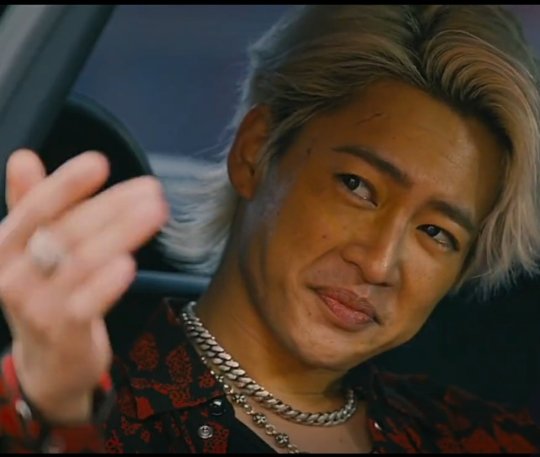
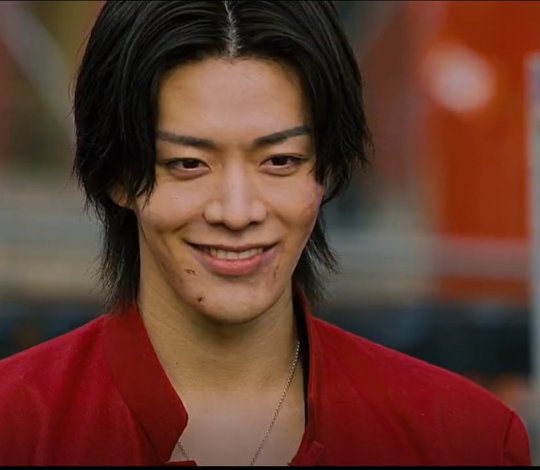
#high&low#high&low the worst cross#amagai kohei#suzaki ryo#cross posting my meta from twitter#to be the change i want to see in the world
102 notes
·
View notes
Text
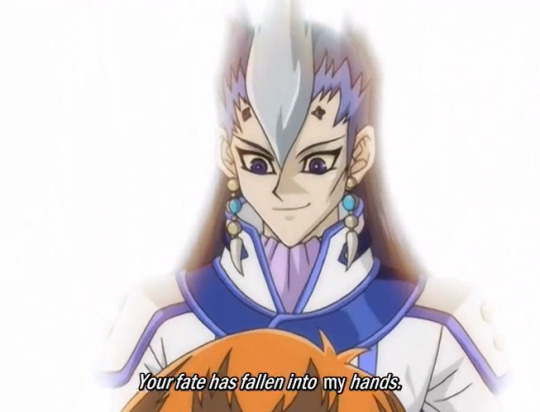
Yu Gi Oh GX and Alchemy: The Albedo
A continuation of my previous post taking a deep dive into the alchemy symbolism in Yu Gi Oh GX. Yu-Gi-Oh Gx Season 2: Society of Light Saga introduces several new ideas at once into the spinoff's storyline. Tarot Symbolism, a battle in the universe between creation and destruction which flips the usual symbolism by making the light / white coded force the light of destruction which is in opposition to the righteous darkness, and the Neo-Spacians to Judai's deck. While these ideas may seem all jumbled they actually connect back to alchemy (and Jung) and continue Judai's arc as an apprentice alchemist.
THE LIGHT OF DESTRUCTION
The main antagonist is Saio Takuma, a host of the Light of Destruction a universal force of destruction that wants to bleach the world white. In case you couldn't pick up on the subtle color symbolism there, the second season corresponds to the second phase of alchemy Albedo, symbolized by water and the color white.
The goal of alchemy is to create eternal life by creating the philosopher's stone which creates a ripple effect affecting the entire world, as above, so below. However, Alchemy is more about the process than the end result, mixing metals together through different stages again and again to purify them, the same way Judai fuses new heroes for different situations in his duels. That process is Black -> White -> Yellow -> Red.
After the nigredo stage where the stone is boiled and putrefied until the solution turns back, in the alcbedo stages is a purification referred to as albutio - the washing away of impurities. This phrase is conerned with "bringing light and clarity to the prima materia (The first Matter). The first matter being the starting material that eventually gets turned into the philosopher's stone.
As mentioned above the antagonist for this season Saio Takuma host to the Light of Destruction takes this step of the process too far by seeking to bleach the planet entirely and wipe out all life. Considering the villain is called The Light of Destruction and the main villainous force is The White Dorm this season is RIFE with color symbolism.
A trend I've noticed for villains in both the first and second stages is that they threaten to trap Judai and the main characters in that stage. In Nigredo, by dueling the Seven Stars in Yami no Games Judai risks being trapped in the darkness. When duelists lose to Saio Takuma or one of his possessed victims, they are purified completely of all individuality and join his cult. Alchemy is a violent process... in order for a union to occur these opposing forces must clash with one another.
“Looke well upon these two Dragons for they are the true principles of the beginning of the Philosophy…. the wingless dragon is sulphur because it never flies away from the fire. The winged serpent is quicksilver… these two must be united.” Their union, however, is “a most violent and bloody copulation.”
Which is why GX chooses to represent these alchemical steps as antagonistic forces, because alchemy requires two opposites to continually clash (chemical wedding fire and water, earth and air etc. etc.), and just like in alchemy in real life you must sometimes clash with someone who's your total opposite in order to more closely understand yourself.
Vs. EDO PHOENIX
Judai starts to drown in these waters of self-reflection after he faces, and loses to the first shadow archetype the anime throws at him Edo Phoenix. We'll cover Edo more later on in this post, but Jung considers the shadow to be the repressed, unseen part of the psyche. Edo represents the shadow of Judai in a lot of ways, most obvious he's the dark-hero to Judai's idealsitic hero. He's the only other hero archetype user in the anime, but unlike Judai's super sentai and ultraman inspired elemental heroes, his Destiny Heroes are all based off of anti-heroes in british pulp fiction (such as Jekyll and Hyde). In fact Destiny Hero Double Dude, clearly based of Jekyll and Hyde is the quickest explanation for the relationship between a man and his shadow.

"With every day, and from both sides of my intelligence, the moral and the intellectual, I thus drew steadily nearer to that truth, by whose partial discovery I have been doomed to such a dreadful shipwreck: that man is not truly one, but truly two.” -Strange Case of Dr. Jekyll and Mr. Hyde
Jung divides personality into a split consciousness model, the persona which is the mask we wear in our everyday life to face the world, and the shadow which consists of everything hidden under the mask that we don't show to the world.
Jung equates each stage of alchemy into different archetypes of the unconscious.
Nigredo - The Shadow
Albedo - Anima and Animus
The Wise old Man
Rubedo - The Self (Indviduation)
A duel with Edo Phoenix for Jason is much like his confrontation with Darkness / Fubuki a deep dive into the Nigredo stage, except this time for Judai the duel is personal because Edo has things to say. He's here to call out Judai Yuki (or Shmaden Shmuki in the dub). Fubuki really wasn't a personal foe for Judai (yes he's Asuka's brother, but Judai didn't know that at the time) he just represented the first time Judai had to duel with stakes on the line instead of just for fun.
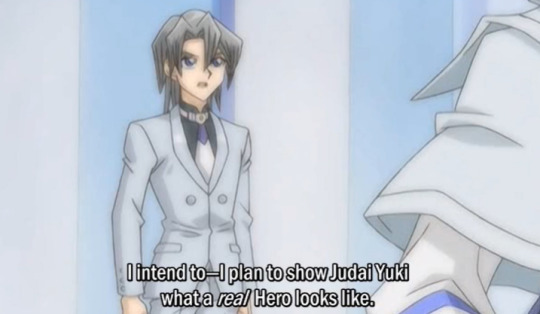
Edo has a few things to say on judai Yuki, someone who so far has been talked about over and over again as having a "pure" heart for dueling. Edo is the first to suggest (and other characters will follow up on this later) that dueling for nothing more than pure enjoyment might not be a good thing. Edo also specifically uses a deck that has been touched by Sartorius's darkness during his first duel with Judai, to further the Nigredo symbolism.
Judai and Edo mirror each other all throughout the first part of the duel. Edo shows that he can create different fusion monsters using the exact same elemental heroes as Judai as material - when he fuses featherman and burst lady he creates destiny hero phoenix guy. There's a bit of symbolism here starting with his name - Edo Phoenix. Phoenixes are traditionally considered the "ying" to the "yang" in chinese alchemy. Destiny Hero Phoenix Guy is made from the same materials as FlameWingman, which features the head of a dragon as one of its arms. Phoenix Guy's effect is that it can't be destroyed in battle by monsters with the same attack - when it clashes with Flame Wingman it can't be destroyed much like it's impossible to destroy the shadow part of your personality.
Edo's callout to Judai is similiarly something that cannot be something that can be ignored or dismissed, it must be reoncicled with.

This is fun to you? Don't make me laugh, Judai! There's nothing fun at all about the fate of heroes who have to fight. The weight of the crosses that heroes bear, the suffering and hatred they endure. Can you even fathom that, Judai? Suffering and hatred? Those are the strengths that support a hero! People like you, who only see heroes as cool or inspirational make me sick. I actually need them - I need real heroes so that I can live!
Once again this callout of Judai's behavior is echoed again and again in season 3 because this show has good foreshadowing - but Edo is specifically calling out Judai's shallowness, Judai admires heroes like a child watching television without acknowledging the hurt and suffering that heroes go through. Edo needs to believe the fact that heroes and justice both exist in order to live, because he's still grieving the loss of his father at a young age and he copes by telling himself he's on a dark hero who will solve his father's unsolved murder and avenge him.
Judai is also similiarly adopting a mask of being a hero in order to cope with a lonely childhood marked by tragedy, it's just he chooses a different mask. Edo pretends to be a dark hero, and Judai a carefree pure-hearted Shonen hero. When confronted with the similarity between himself and Edo, Judai loses the duel and immediately after Nigredo we see Albedo - Judai's cards all dyed white.

THE WASHING OF THE MUD
Albedo is sometimes referred to as the "washing of the mud" the constant process of scrubbing the soul after the soul has been putrefied and its darkest contents brought to the surface in Nigredo.
Altogether, the divine water possessed the power of transformation. It transformed the nigredo into the albedo through the miraculous ‘washing’ (ablutio); it animated inert matter, made the dead to rise again, and therefore possessed the virtue of the baptismal water in the ecclesiastical rite. - C.G. Jung, Alchemical Studies, CW 13, par. 89
Similarly in Yu-Gi-Oh Gx, after a crash course in Nigredo brought to him by his darker half Edo, the dark hero to his pure-hearted shonen boy protagonist - unable to see his cards anymore Judai leaves Duel Academy Island for the sea. Not only is this a direct parallel to Manjoume's journey in Season 1 (losing to a dragon (Misawa's water dragon) -> going to the sea -> washing up on North Academy a tundra that's all ice and rebuilding his deck from scratch.
Each of Judai's friends along with being characters in their own right also represents stages in alchemy, Manjoume who wears black is nigredo and similiarly experiences most character development in season one, Asuka who wears white is albedo and serves as his anima counterpart (more on that later), Misawa and Kenzan both wear yellow for citrinitas and guide him with wisdom (Kenzan is the only one not swayed by Saio's mind control, Misawa appears to Judai when he's lost in the desert dimmension in season 3 as a wiseman).
Manjoume represents Nigredo so of course, Judai parallels him after enduring his own Nigredo stage through his collision with Edo. Of course you might ask if last season was Nigredo then why is Judai going through it again you might ask. Well, Alchemy is a process of continual death and reverse, dissolving and coagulating over and over to refine into a purer material. It's not really a one and done thing. Symbolizing this, the one who hands Judai his defeat that sends him soul searching is Edo Phoenix, once again Phoenixes are important to Alchemy because they too dissolve into ash and die only to be born again.

Saio also draws the death card diagonally, neither upright or reversed to symbolize how Judai is actually going to experience both, he must endure a symbolic death first in order to be reborn. The Death Card isn't so much about permanent death, but rather the death of old ideas that's required for change.
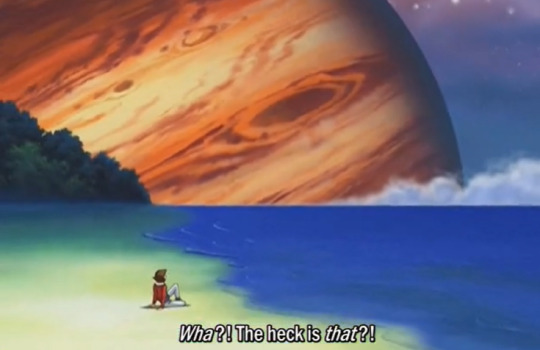
Judai wakes up on a beach after traveling on a boat out to see (similiar to Manjoume), not only does this symbolize the "washing of the mud" referred to above, but water is also the element associated with Albedo. Judai first sees a flaming meteor and when it strikes him he's transported to a beach on an alien planet, Fire (Nigredo) -> Water (Albedo). The first Neo-Spacian Judai encounters is a water attribute monster to, Neo Spacian Aqua Dolphin. In fact, just like the elemental heroes all Neo Spacians are marked by their associated element because they too represent the mixing of elements Judai uses i his deck to perform alchemy. Aqua Dolphin, Air hummingbird, Grand Mole, and Flare Scarab.
When he wakes up on the beach the first thing Judai assumes is that he has died (symbolic death). Then he asks if he's in heaven or hell, only to find he's on an alien planet. There's a special significance to Judai's new "Neo-Spacian" cards being associated with the universe, and "Neos-Space". It's not just that Neos himself is a reference to Ultraman. It all ties back thta fundamental rule of Alchemy: As above, so below.
Quod est superius est sicut quod inferius, et quod inferius est sicut quod est superius. That which is above is like to that which is below, and that which is below is like to that which is above.
Everything in the universe came from one material which divided again and again and differentiated, and therefore everything is connected. The microcosm (the small world, the human being, the miniature universe) is connected to and affects the macrocosm (the great world, the universe as a whole). If everything is connected then the changes you make and the actions you take will inevitably radiate out into the world.

You could say thatlight and dark use our universe as their battlefield. Put a different way, consider it a world where good and evil duel perpetually. The universe was a world of gentle darkness - one which nurtured life. However, this universe is on the verge of ruin by the Light of Destruction. We have searched for someone who is able to fight that light with the power of righteous darkness... and we happened to find you.
In terms of Yu-Gi-Oh GX, the basic worldbuilding and lore is that the universe was first one substance and then it divided into two forces the gentle darkness that nurtured creation and the light of destruction which destroyed. Balance between these two forces must be maintained, but when the light of destruction gains an edge the Neo-Spacians appeared before Judai to call him to protect Neos-Space with the power of the gentle darkness.
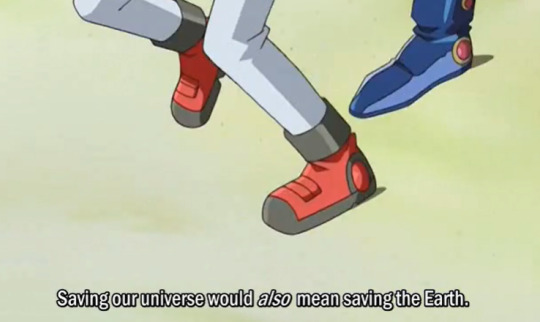
In other words, Judai facing Saio on earth (the small world) will radiate out and prevent the destruction of Neos space in this battle between universal forces (the great world). Judai saves the universe by playing card games, it sounds silly but symbolically it just means that once again that you're connected to the world around you moreso than you realize and your actions will inevitably have a ripple effect and effect the world and people around you. Judai symbolically saves theuniverse by beating Saiou in a duel, but in the world of human beings his actions save both Saiou and Edo's friendship.
In GX worldbuilding terms as well, Neos-Space is an alternate dimmension one of twelve inhabited by duel spirits who are real, sentient creatures who's powers are called upon with the magical cards. When Judai saves his world, he also saves Neos Space because their two worlds are connected.
A lot of shows have "the fight between the forces of light and darkness never end" but GX reframes the never-ending fight as the process of alchemical refinement. It also flips the traidtional light and dark associated symbolism so light represents destruction and Judai needs to tap into the power of darkness in order to fight it.
Furthermore, Judai harnessing his iner darkness is Jungian symbolism. As stated above, Jung divided personality into perona, shadow and the further into anima and animus. A person goes through the process of individuation in order to grow up into a well-rounded human being, and this process requires incorporating all the different parts of your personality into your ego. The pure-hearted Judai however, has a dark shadow and we'll learn in season 3 part of that shadow consists of the memories of Yubel he repressed when he abandoned Yubel. However, because Yu Gi Oh GX is a series with bad pacing but excellent foreshadowing - Judai flashes back to his childhood when he notices something is missing and he can't remember the reason why he's been dueling.
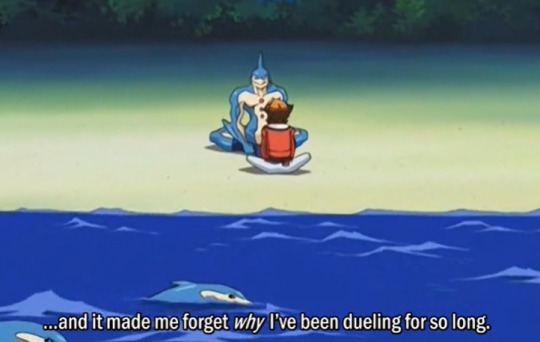
Why else would Edo's challenge to Judai disturb him so much if there wasn't something missing, something he's not quite remembering about the reason he started dueling something hidden in darkness.
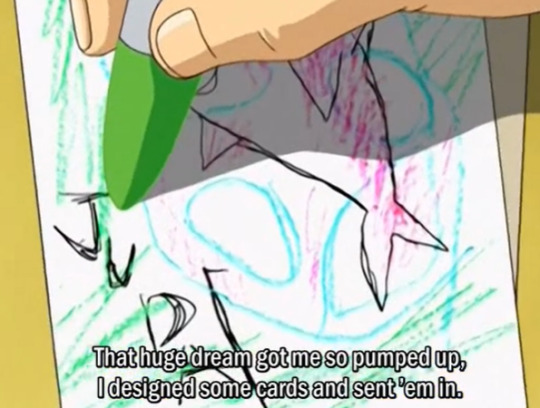

The origin story we eventually get for Judai in season 3 is actually give to us slowly over time in three parts - because Judai himself takes that log to remember it due to his repressed memories. In season 1 he remembers that at one point he was able to hear the voices and card spirits when he was younger, but somehow lost that ability for a long time until he met winged Kuriboh. In season 2 - Judai remembers the Kaiba Corp contest that launched a satellite into space where his drawings of Neos and the Neos Spacian were eventually infused with the power of darkness. By recalling his memories and remembering that part of his childhood he gains the powers of the Neo-Spacians (having done the work of exploring his shadows).
However, Judai's origin story is only 2/3rds complete and the last missing piece will come with Yubel's introduction in season 3 who serves as Judai's literal shadow.
Judai doesn't completely integrate his shadow here, but once again alchemy is a process, so he'll have to do more work later. However, he's confronted his shadow enough to make the difference during his rematch with Edo.
VS ED - A NEW POWER! AQUA NEOS
I'm skipping Manjoume's duel with Saio, because I'm putting all the tarot stuff in another post. Which gives us more time to talk about Edo, Edo's flashback shows his first meeting with Saio in the rain. Saio the leader of the white dorm, white, rain/water, all symbols of Albedo.
Edo also represents Albedo, he dresses in a silver grey / white suit, his hair is similarly silver and gets bleached white at one point, his closest connection to any character is to Saio, his defeat of Judai starts the alchemy process for Judai, and his defeat of Kaiser Ryo sends him spiraling into reverse alchemy (more of that later).
Now back to Judai - before facing Edo he has to claim the rest of the Neos Spacians from the elemental plains where they reside, such as going to a magma pit to claim flare scarab. Fire, wind, water, earth, elements, alchemy....(kronk voice) it's all coming together.

Anyway, Judai worries all of his friends by telling them about how he was abducted by space aliens and the duel begins. This time Edo is the one who loses and it all has to do with the work Judai has done confronting his past which Edo has not. The biggest foiling point between the two of them is that Edo and Judai's hero worship comes from their inner child. Their desire to be a hero is childish and immature, as neither really knows what being a hero is yet, but also pure.

Aster: Judai, are you... that happy to be showing off your heroes? Still, I won't stand for any heroes unburdened by destiny! Judai: Listen... What happened to your dad was really sad. But... doesn't it just pump you up to meet some new heroes? You would know, wouldn't you? I bet your dad did - he must've made your D heroes so that seeing them would make you feel happy, not sad!
It's a collision of opposites once again, Judai looks too much into the light but here Edo's been stewing in his own dark feelings of mourning his father, and a desire for revenge for so long he's forgotten happy memories of his father.
Edo's not wrong that heroes have to carry burdens, it's more foreshadowing for lessons that Judai has to learn in Season 3 but there's a difference between carrying your burdens and drowning because of them. Later on in the Saio portion of the fight it's shown that Edo's time has stopped completely just like his signature card the clocktower, Edo is still a child, the same way Judai is still a child.
Edo who isn't aware of that yet loses to Judai who's at least recovered some memories of his childhood. In this instance Judai is the catalyst which makes Edo change.
Of course Judai's arc pretty much stops here, as I said Judai's characterized by stagnation through the first two series. That's not to say he doesn't change at all, in Season 1 we get the speech where Daitokuji asks him what he's gained over a year and Judai says he's gained friends. Not only does he have friends, but it's the season where he first takes up the burden of dueling with his life on the line to save other people so he can protect those friendships. Which seems like standard shonen fair but is deconstructed in season 3.
Season 2 is where Judai is first seriously questioned on his lack of reason for fighting, and his lack of any burdens. While Judai doesn't really change because of this question, his lack of change is indicative of something missing in him.
Arguably, a lot of problematic behaviors of Judai's in Season 3 start in Season 2, they're just not immediately called attention to. We'll talk about them now in the White Arc.
The White Dorm
Alchemy is heavily associated with color symbolism, Albedo is symbolized with the color white so of course one of the main antagonistic forces this season is the white dorm.
I'll touch more on Manjoume's role as the main head of the cult for most of the season in my upcoming tarot post, but Judai's friends being integrated into the white dorm means they are experiencing Albedo right alongside of him. However, in this case they experience a dissolution. Each of his friends dissolves entirely and experiences a death of personality, making them puppets for Saio / The Light.
In each duel, Manjoume, Bastion and Misawa the Light preys upon one flaw in their personality. For Manjoume it's his inferiority complex and his desire to beat Judai (a rivalry he takes much more seriously than Judai), for Asuka it's her emotions that people are constantly telling her to calm down so she can conform into a more feminine role, for Misawa it's the fact everyone in the school just decided to start ignoring him after they found out he was a furry.
(On a more serious note a lot of people think the show dropped Misawa's arc entirely, but I'd argue there is a three season arc there and that it mirrors Judai's. In season 1 Misawa is an obsessive perfectionist duelist considered one of the two rivals to Judai, and like many students there doesn't think of much of his future but becoming a pro duelist. However, the encounter with Tanya shakes him by waking him up to a desire for love in his life and Tanya disapepars. In season 2, Misawa's failed to live up to his potential as one of the higher ranking duelists in the show and kind of washes out like Hell Kaiser Ryo did when he figures out he wasn't as great as everyone at the school told him he was. Saio compounds on this by ignoring him, which on top of his friends all deciding to ignore him makes him vulnerable to being recruited to a cult. Misawa's the only one who joins willingly if you think about it, which shows how unloved he feels in season 2.)
Aster's speech on the matter is revealing in regards to the loneliness Misawa feels.
Misawa doesn't actually want to get better - he just wants those around him to see him as being good. Being a true duelist is lonesome. Even without attention from others, they'd just follow their own path with faith in their deck and tactics. Results and praise just come after the fact, but Misawa is different. All that lies deep in his heart is an idiotic elitist desire for the ability to be noticed by others. It worries you does it not? It pains you does it not? That others will not acknowledge you. In the end he'll lose faith in himself. Something like that can't become a true duelist.
There is a reason for this brief tangent with Misawa in the Judai's friends section, in that the friend group's collective decision to ignore Misawa probably because they assumed he was an elite duelist who could take care of himself shows that their friendship is not as strong as it seems.
The cracks are already starting to show in Season 2. Not only does everyone collectively neglect Misawa, but Judai as a whole lets each of his friends be taken by the light, and he's either not around or doesn't lift a finger to stop it. Asuka and Manjoume spend weeks being brainwashed and Judai feels no urgency to reach out to them and fix it. This is even something commented upon by Judai himself when he finally goes to face Manjoume.
What this means in alchemy terms is that these bonds are broken, and reforged by necessity in order to be forged into healthier friendships. Judai's friends experience a dissolution in season 2, and Season 3, before he's able to forge a much stronger connection in Season 4.
Judai's friends who are dyed white also each represent a personal flaw of Judai's that he needs to be cleansed of. For Manjoume, it's Manjoume's general stagnation which Judai reflects because Judai is a stagnant character for the first two seasons. Part of the reason Judai is stagnant is because of the codependent friendships he forms with others, Judai and Manjoume are characters who both struggle to stand on their own two feet.
As mentioned above, Judai is also someone who tends to have his emotional needs neglected by others the same way Misawa was because everyone assumes Judai can take care of himself.
THE WHITE QUEEN
The last and probably most important is Asuka who I've mentioned in my last post is an anima, or a female Judai. Now, I'll elaborate on that point.
The Anima and Animus are what Jung terms "Sygzy" a term used y Jung to mean the union of opposites. Similiar to the Taijitu or Yin and Yang symbol. The feminine Yin and Masculine Yang each tcontain a taenite, a dot that represents the yin (feminine) within the yang (masculine) and vice versa.
What it means essentially is that every single person is a collection of what we traditionally consider "masucline" and "feminine" traits. Of course those definitions depend on culture, but gender is like money. Yes, Gender is completely made up, but I can say things are masculine and feminine and you'll know what that means the same way that money is made up but I have to pay five dollars for my boba tea.
Of course Gender isn't split down a male / female dynamic either but this is really old psychological framework we're working with.
Even Jung however as old was onto something when he observed that the way men are socialized especially growing up (with gender roles being as rigid as they are) leads to them having underdeveloped or even suppressed feminine traits.
Jung believed a male’s sensitivity is often lesser or repressed, and therefore considered the anima (the unconscious feminine side) to be one of their strongest sides. Ergo, men are more likely to repress their feminine sides, and at the same time the only way to develop those sides is to seek out femininity and interact with it. That sounds like basic rules of human interactions, the only way you can learn to have healthy relationships to other people and how to show your emotions in healthy ways is by interacting with people.
Which is where the chemical wedding comes in. The Sygzy is the union of opposites fanima and animus) formed by a chemical wedding between the two.
Men usually progress through four stages when it comes to integrating their anima (in other words they mature in the way they perceive and relate to the women in their life). These are represented by four archetypes, reoccurring characters and symbols in fiction. Jung believed the reasons archetypes kept showing up in different stories is because they symolized something deep within our own subconscious.
These four archetypes are:
Eve (mother)
Helen (romantic interest)
Mary (religious devotion)
Sophia (wisdom, guide to inner life).
Asuka serves as Judai's anima for the first two seasons, and vice versa, but I'd argue they never pass the first two stages.
My reasons for arguing this is number one, Judai and Asuka only have two duels against each other in season one and two. Number two, Jung marks Albedo as the stage of integrating your Anima. Asuka wears primarily white, she's basically female Judai sharing his love of card games, and their final duel happens in season 2.
Judai doesn't view Asuka as amother figure per se, but when he first meets her he is a child as their first duel takes place in the third episode. So she is someone who 1) nurtured his growth, and 2) could have been a possible romantic interest for the first two seasons.
I think Judai and Asuka's two duels however are an example of a chemical wedding that turns out to be non-romantic. As Asuka is basically replaced as Judai's potential love interest by Yubel or arguably Johan too. Also the fact that they are basically set up to be love interests only to have that set up subverted is the point here.
The strongest connection between Judai and Asuka, and the reason they serve as each other's anima and animus for a time is thatthey both don't really fit into the roles society assigns them. Especially their gender roles, Judai is a subversion of the hot-blooded shonen boy protagonist and Asuka a subversion of the female lead character always being the love interest.
As stated in my previous meta, Asuka is very like Judai in the fact that her first love is dueling. Therefore she doesn't fit into the mould of what a lot of people consider to be feminine, despite being the 'queen' of obelisk blue. This post goes into a lot more detail on the relationship between Asuka and Gender.
Asuka seems to be written as a response, or maybe even a correction of Anzu Mazaki from the first anime. A character who while important, suffered from what many consider to be female shonen character syndrome they mainly exist to be an emotional support to the protagonist and lack flaws / ambitions of their own. I guess the english word for it would be chickification.
Here let me cite the scholarly resource known as Tvtropes:
You have an Action Girl, who may also be One of the Boys. She rocks. But she's probably the only female in the main cast, or at very least, the most openly tomboyish in the female cast. And it doesn't seem to be playing well with the 18-35 male demographic. So the writers, either on their own or because of Executive Meddling, soften her tough edge. Gradually, the Action Girl starts seeing significantly less action. She exchanges her armor for outfits that show off her figure. Her plotlines become increasingly centered around romance, dating, and fears that she isn't married yet. She gets easily turned into a Damsel in Distress by the same villains she would have handily thwarted previously just so the male characters can save her. The character who was once comfortable and competent has been Chickified. This is about maturity being equated with passivity, with "girls/women can't", rather than just learning to make wise choices or cope with challenges.
To simplify, the predominant trend in Shonen manga is that men are allowed to be active characters with agency, and female characters are always reduced in agency and independence, usually defined by their relationship to a male character to the point where femininity goes hand in hand with passivity.
The main problem with this is it doesn't allow female characters to have thoughts and feelings of their own, outside of either the roles they play to the men in their lives, or just them being reduced to their gender, in the friend group they're just "the chick." A lot of manga authors even admit to throwing in female characters just to have a female character without really thinking of their role in the story.
Asuka is a deconstruciton of both the way female characters are treated in this gnre, and also she as a girl has to deal with the expectations to perform femininity from everyone around her.
Asuka is feminine, she's considered the "pride of the Blue Girls", at the beginning of the show she's well-respected, popular with the girls and also incredibly detached and bored. She basically extorts a duel out of Judai just to find a challenge. It's easy to see where this dissatisfaction comes from, not only is duel academy weird about women, a lot of the men Asuka is forced to interact with reduce her to her gender.
A common Asuka filler / solo episode usually follows this formula, "A man with a crush on Asuka challenges her to a duel with a condition that she'll date him or is otherwise trying to coerce her into doing something else she's uncomfortable with."
A nice subversion to this formula is early on in the dub where Judai and Tennis Guy compete to be Asuka's "fiance" only for him not to know what that even means, and Asuka to just say it means "friend."
Which just might be what makes Judai so unique to the point where Asuka starts to consider him a romantic possibility, because he is the one exception, the person who only ever regarded her as a duelist first and a girl second. As Asuka is feminine, but she exists in a world where she's not allowed to be feminine and still retain her activity and agency at the same time.
Manjoume and his two duels against Asuka could be seen as a metaphor for the way the world, and especially boys in Asuka's life impose femininity on her and expect her to conform to gender roles / their gendered expectations of her. Manjoume duels her twice, both duels resemble chemical weddings of a sort with the goal of getting Asuka to accept his feelings towards her.
When he beats her in the second duel look what Asuka's basically reduced two, the queen at his side, the second in command of the white dorm, and most of all, the elegant, refined, cold-hearted girl. She has ceded all agency due to the fact she's being mind controlled, she's also lost all of her emotions to the point where everyone describes her as being "like ice" in order to conform to a role given to her by a man.
When Judai and Asuka duel a second time, it is another chemical wedding, and one necessary for Asuka's development as a character but it's decidedly non-romantic. It's also a re-creation of this Splendor Solaris plate, a meeting of the solar king and lunar queen.
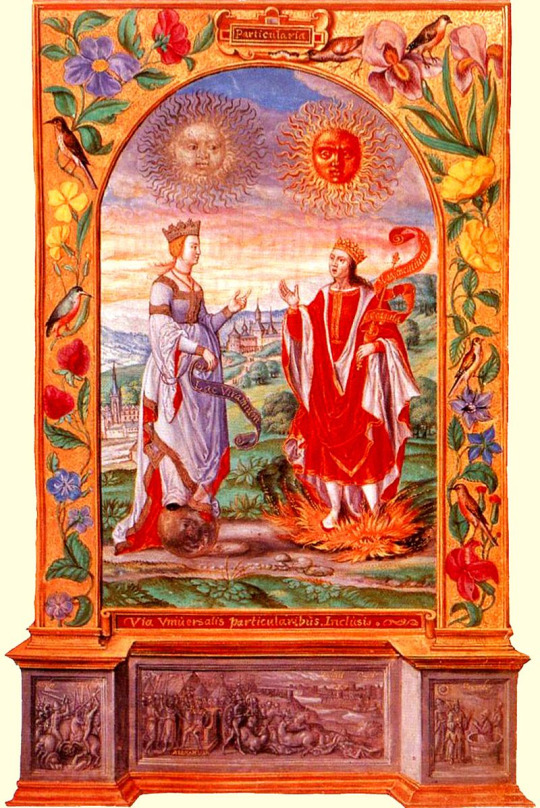
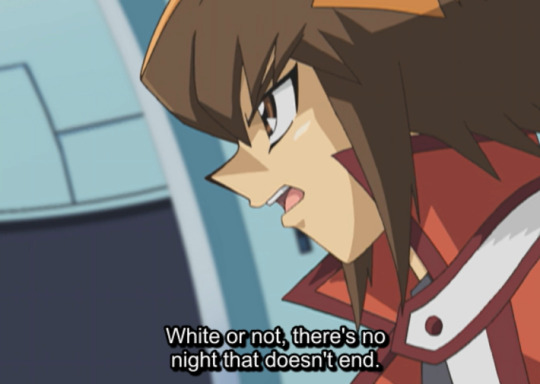
Judai: The sun will rise high in the sky! So open your eyes already! Asuka: Impossible, right now I am my true self. There's no need for me to awake. Judai: Then, I'll have to force you awake. I attack White Night Dragon with Flare, Neos. Let everyone's fiery feelings reach her! Melt it! Melt Asuka's frozen heart! Burn it to ash!
The episodes are called "A White Night Duel" associating Asuka the queen of the obelisk dorm with night time, and the moon. The first duel with Judai and Asuka took place in the moonlight as well, and it took place on water.
The duel also marks them as a pair of elemental opposites. Asuka's brother Fubuki uses snow character in his name. Asuka's swapped out her cyberladies deck for an all-ice deck.
Judai's commonly associated with the sun. Before this Fubuki stated that Judai was riling her up and igniting her flaming spirit. His winning the duel is using Flare Neos a fire attribute monster to defeat the "White Night Dragon".
So Asuka's in a state where she's finally been forced to conform to everyone's expectations as a girl, and given up the struggle of trying to be herself and as a result all of her emotions have shut down. Judai manages to excite those feelings inside of her once again by reaching out to her, not as a love interest might (this duel is way, way different from the way he tries to save Johan from Yubel's possession) but as a duel rival would by trying to reignite their rivalry.
Judai doesn't even say that it's his burning feelings that reach her, but rather everyone's. Manjoume and Fubuki try to reach out to Asuka in the duel by giving Judai cards to play, as a love interest, and a brother, but they both also have trouble seeing Asuka for who she really is from time to time which is why their cards don't work. Judai reaches her because he's not trying to be a love interest in this duel, or anything other than a friend.
This duel I believe solidifies what they are to each other, which is why Judai integrates Asuka as part of his anima and they have no further duels after this.
As to what Asuka exactly provides to Judai after going on this long rant about how Judai and Asuka's friendship is unique - well, Judai doesn't really conform to gender roles either.
If Asuka is the typical girl in Shonen Manga given more depths, and burdened by the expectations everyone holds towards girls around her, Judai too suffers from those expectations. The manga reaches a point where Judai is just expected to be the pure-hearted shonen hero who tackles everyone's problems.
Judai isn't allowed to be vulnerable or feminine because a lot of masculine roles get pushed onto him, he has to be Sho and Kenzan's big brother, he has to be the protector of everyone, he has to be the leader because he's the best duelist. In late season 3 he's forced into the role of being king by Yubel's manipulations.
On top of that there's the subtext that Judai doesn't conform to heterosexual and cisgendered norms, like is two other possible love interests are Johan a dude, and Yubel a nobinary dragon. His Jungian shadow is also yubel, a nonbinary dragon so what does that exactly say in regards to Judai and his own gender.
Asuka even builds up one sided feelings towards Judai that could be seen as the typical shonen main character guy and girl relationship that happens in almost every manga - except Asuka lets go of those eventually, because in letting go of that she gives Judai what he really needs a friend.
Asuka and Judai's friendship is important because they both don't fit in with what everyone else expects them to do, and want to be seen for their skills as duelists first before their gender. That's what they give each other through their chemical wedding and having gained and solified Asuka's friendship, Judai integrates his anime and moves to the next step of alchemical refinement.
HELL KAISER RYO / NIHILIXIR
So I'm going to address Hell Kaiser in one go, because I love him and also he represents an example of reverse alchemy or the nihilixir. Usually death and rebirth is a good thing and necessary for alcemical refinement, but sometimes instead the process makes you degrade into something impure, descending into baser instincts.
The transformation Hell Kaiser undergoes in season 2 and onwards is an example of something which resembles alchemy (for instance you could say his descent to the underground dueling arena, and his climb back to the pro leagues resmebles the drowning king where the king simultaneously drowns and rises) however instead of the death and rebirth leading to a more refined version of himself he just gets worse.
The catalyst for this arc is of course Edo Phoenix, but also a very true to life problem of a kid who's always been told he was going to be number one, going out into the world and finding out he's a small fish in a big pond. I'm going to steal Kate's post here because she's my Daitokuji-sensei. Here they use Salem from RWBY as an example of reverse alchemy, mainly the inability of an immortal character to grieve and accept death means they cannot move forward and instead move backwards and experience nothing but negative character development.
It's not just that Hell Kaiser lost to Edo Phoenix (a symbol of death and rebirth), it's that he can't accept the loss specifically because he's been told all of his life he's a winner. Hell Kaiser is such a perfectionist (he even told Judai that he thought his perfectionist tendencies held him back from true growth whereas Judai represented limitless potential) that he cannot accept or cope with the fact that he lost. He can't see that he might not have been as good as everyone always told him he was, and he starts to spiral.
So Hell Kaiser experiences a journey where he descends to the underworld (underground duels) and comes back, hence the name Hell Kaiser because he's been to hell and back but he doesn't change as a result of that journey. It's a false rebirth, rather than becoming something new he just doubled down on who he was before.
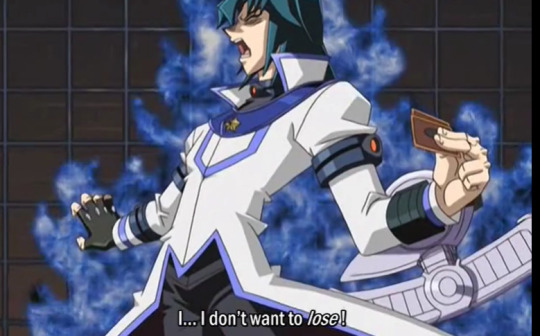
I don't care how, but I want to win and defeat you. I get it now, I finally do. I've lied to myself ever since my match with Ed... I duel by respecting my opponent. I thought winning or losing wouldn't matter if I did that, but I was wrong. I thirst for it - for victory! ANd if I have to steal victory from your hands, I will!
Hell Kaiser's original philosophy is a "respectful duel" which is just a duel where you try to understand your opponent and what they're thinking. However, after his duel with Edo his perfectionist tendencies win out against his desire to understand his opponents and he becomes obsessed with victory.
If Salem goes in alchemy in reverse because she won't accept grief, Ryo goes through reverse alchemy because he won't accept the prospect of losing or that he might be wrong. Alchemy is also primarily about changing into a new substance, a person who won't admit they're wrong and doubles down can't change.

Ryo goes one step back in alchemy by changing his outfit from white (albedo) to black (nigredo). Everyone treats this as a big change / rebirth from him, but in their duels against him Fubuki his rival, and Sho his brother both say the opposite.
Fubuki calls upon the darkness to try to match Hell Kaiser's deck with his red eyes deck, believing that Kaiser must be lost in darkness or otherwise be possessed to be acting the way he is.

Only to have it confirmed twice this isn't the case, Ryo hasn't changed. He's stayed the same person he was at season one and his so called dark turn is actually character regression because he refuses to adapt to new circumstances. Even the way he's depicted in fire is once again, a reference to nigredo because he's taking one step back while everyone else is in the albedo stage.
Of course being obsessed with winning seems like it's not the worst thing in the world, until Ryo's obsession with chasing the thrill of victory leads to him not only nearly killing his little brother with the same electrodes he was shocked with in the underground arena (remember in season one where he lost a duel on purpose to camula to protect Sho's soul) and then in season 3 developing a heart condition because he kept using the electrodes during underground duels.
Ryo also descends into death by embracing the cyberdarks deck, a deck which primarily uses graveyard effects to make his monsters stronger. Nihilixir comes from resisting change, loss, grief all of these things which are inherent to life, and therefore leading to stagnation and death.
I spent so long on this section because one - this is GX's primary example of negative character development, but also because this too mirrors eventual growth Judai will have in season 3. Ryo is a foil and rival to Judai, and there will reach a point where Judai too much like Ryo rejects grief, and doubles down on power, becoming obsessed with victory. Judai goes through some major character regression before he can grow again.
EDO PHOENIX
This post, much like GX Season 2 has put off Edo's character development for long enough. Judai and Edo for all of their differences have one thing in common that they're both trapped in their childhood.
They are both lonely children who leaned on stories of heroes in order to comfort them. Edo believes in dark heroes that would avenge the death of his father, Judai believes in heroes who save others. They both play hero to cope, Edo plays a hero on a quest of revenge, and Judai plays hero to all of his friends, taking on their burdens as his own.
If anything a lot of cracks in Judai's behavior show in season 2 and become a problem in season 3 because he failed to address or fix them. Neglecting his friends his friends until they all get brainwashed and become victims of the main villain? Happens again in season 3. Judai being told he can't keep dueling for fun and will have to eventually accept responsibility? Happens in season 3. Judai realizing being a hero means carrying brudens that might crush you? Happens in season 3.
Saio is kind of a silly villain, he's possessed by evil space rays that made him try to use a satellite to destroy the earth. However, symbolically with the light of destruction as a force of too much light that wants to wipe out the dark I think the season achieve a lot in Jungian terms. There's an entire monologue in the Manjoume vs Judai duel episodes about how the light of destruction wants to banish all shadows, which is evil, and blocks the light.
Calmly close in your eyes a pure-white sun shining in the sky as it iluminates a flat-pure white land. Let us assume that something now sticks out on the land. It creates an evil - darkness. Which is evil and blocks out the light. We must take all those who bring forth the darkness... and eliminate them until they are no more!
This and many monologues from the white dorm / saiou hint that maybe, purity.... is a little bit bad. Alchemy is a process of balance by two opposing forces meeting in a chemical reaction, but the light just wants to bleach everything.
This season if anything sets up the idea that purity isn't that great... after all the light monologues about wanting to wipe out shadow, but it's impossible to get rid of your shadow in a Jungian sense.
So we have the start of the purity = bad symbolism, right next to Judai who is a character who's still constantly being lauded for his "purity" his "pure childlike heart" and so on and so forth.
Now is Judai pure because he's confronted the darkness, and come out on the other side of it, or is he pure because he's just... not even looking at or acknowledging the dark. After all Judai's shadow isn't here, Judai's shadow is Yubel and Yubel doesn't turn up until season 3.
Yu-Gi-Oh GX season 2 is paced badly, but there's also something to be said about the way it's structured. Judai basically remains a passive character all throughout, the only time he journeyed to find something is when his cards were bleached white. Judai only ever responds. Judai's friends are kidnapped and he goes to save them.
There's a scene where Judai is sitting in his room with Kenzan and Sho, and then someone walks in and says "Judai, I need you to save the world, someone is going to use a death ray satellite in order to wipe out humanity." And Judai's response is appropriately: "What?"
Which once again, bad pacing because the main character is almost entirely uninvolved in the conflict, but it also sets up the idea that Judai is once again the designated hero. Does he seek out and try to solve problems, or does he just end up getting problems dumped into his lap?
Of course this parallels him with Edo, someone who not only wants to be a hero (to the point where he dresses up and beats up thieves), sees himself as a person on a heoric quest for revenge, but is obsessed with the concept of Destiny and the idea that he must be a special, chosen hero.
The plot takes these two characters, one who is actively trying to be a hero, and one who is just forced by circustmances and his friends into the role of hero and then suggests they are the same.
The introduction of the DD episodes, and the duel against DD and Bloo-D establish that Edo's quest for revenge was pointless from the beginning. The person who killed his father has always been - right next to him, watching him flail around in the dark.

Believe in your D-Heroes power over the future all you want, but the time within you has been paused this entire time. From the moment your father died... you haven't changed at all - you haven't grown up at all. You're the same kid you were back then.
If Edo, the proffesional duelist, who puts on all these airs about maturity and constantly lambasts Judai for not understanding the sacrifices that heros make, the burdens they care and the responsibilities they have is just a child - then what does that say about Judai?
Edo Phoenix, the character that's supposed to represent the phoenix, death and rebirth is a character that's been stagnant all along just like Judai. Death is a part of alchemy, but as I went to great lengths to establish with Ryo's section, in alchemy stagnancy is DEATH.
DD possessed and corrupted by the light, spouts words that are eerily similiar to what Edo says.
Self-interest? Not quite. I wanted to know ehther or not I was the chosen one. Just look at history - all the greats who seized power would always commits some number of crimes. In killing your father, I became great myself - and I proved my status as a chosen one.
DD rants about being a chosen one, but what does being a chosen one mean? He's possessed by the light who saps him of all free will just like Saiou. Season 2 constantly talks about destiny and destined heroes, and for the longest time I thought it was just speaking lipservice. That typical "We the heroes can change destiny if we just believe enough" until I remembered my favorite Jung quote.
“Until you make the unconscious conscious, it will rule your life and you will call it Fate.” CG JUNG
Edo's obsession with destiny comes from not wanting to confront his past and his inner wounded child. If he believes he's a chosen hero on a quest for revenge, he doesn't have to confront what DD pointed out that he's still the grieving child who lost his father.
Since Edo ignores the unconscious, he is for most of the story a pawn in some way or another. He's a pawn to Saio believing and following his prophecies, he's a pawn to DD who killed his father never once suspecting him. The other characters who refuse to make the unconscious conscious become pawns of fate as well.
DD becomes split seeing himself in the mirror, before the voice of the Bloo-D card whispers to him and controls him. Saio becomes split as well between the version of himself Edo grew up with, and the one completely possessed by the avatar of destruction. Saio makes a case for being helpless to destiny since he was just possessed by evil space rays, but even Saio admits while ranting that he always hated the fact that people shunned him for having supernatural powers.
So purity = bad. Not acknowledging your shadow = being controlled by fate.
Then we have our willfully ignorant hero Judai who shows up to save the day as always.
Edo is the one who's actually gone through the process of alchemy and change in order to face this duel against Saio. Edo confronted DD, on a boat which burst into flames (fire) on top of the ocean (water). He basically speedran through Nigredo. He even killed his father in order to move forward through time again.
Edo also having gotten his revenge in the most empty way possible (not only does he find out his adoptive father was using him all along, and that his quest for revenge was pointless because the culrpit was right next to him, but also he has to kill his father's soul trapped in the card in order to win the duel) has no realized that his desire isn't to get revenge or even to defeat evil but to save Saio.
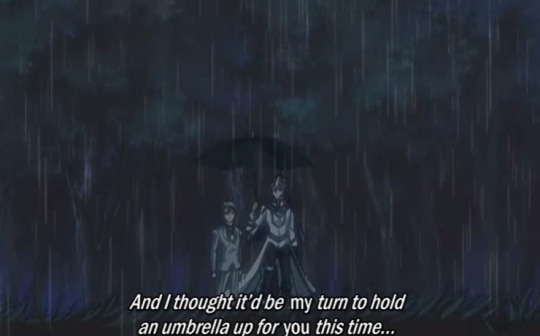
I'm sorry, Ed... I didn't mean to drag you into this. What are you talking about? You're my friend aren't you. [...] It's not fate I'm believing in. It's you, Saiou!"
He realizes this while finding Saiou's soul trapped in a recreation of their memories where they first met, when Saiou offered him an umbrella under the rain. Rain = water = albedo and Saio is wearing white, alright I'll stop now. The rain also scrubs clean his soul as Saio lets go of anger, and frustration and revenge ideas he had tied up into his dark intrepretation of heroism and focus on a friend.
My point is in order to duel against the light of destruction and try to reclaim Saiuo's soul, Edo gives up the satellite key and puts the world at risk in order to save one friend.
Edo Phoenix has finally experienced a death (the death of his father and adoptive father in flames, and the death of his original purpose of revenge) and rebirth. His new purpose becomes not to be the hero, but to hold out the umbrella and shelter Saiou from the rain the same way Saiou did in the past.
He also puts emphasis on his desire to connect with Saiou, and that being more important than any destiny or fate. Edo is trying to connect and collide with others again, and is finally starting to grow and change.
When Judai steps in he has practically no emotional investment, besides you know, not wanting Edo to die, and not wanting the world to get destroyed by a death laser because he lives there. Edo abandons the idea of being a hero, lets that dissolve and does something genuinely heroic in saving a person. Judai plays the hero again, but because he has no personal connection to Saio, practically everything he says about friendship, allies and fate is lipservice.
Edo is propelled by circumstances he thinks are fate the entire time when it's really just him failing to make conscious of the unconscious. However, he confronts his darkest self and then gains the ability to choose - and then confronts Saio by choice. Judai is still being thrust into the position of hero by destiny by the end of Season 2.
Judai ends season 2 not having changed. Since stagnation is death in any alchemy themed show, the show does not frame this as a good thing. Saio uses his ability to show Judai his future in episode 103 in an effort to intimidate him into giving up hope and accepting destiny.
After all this you still try to defy my wheel of fortune? In that case, I shall use my ability of foresight. You shall wallow in despair, and detest your own fate.


Saio not only shows Judai a preview of what will happen in Season 3 when Duel Academy gets teleported to another dimmension, he gets confronted with... bum, bum, bum HIS SHADOW!
Everyone say hi to Yubel!
A horrifying vision which Judai responds to with more lip-service. "I think our fates can be changed!" That's typically what the hero says in this situation.
However, you could also see this as another instance of Judai being forced to look at his shadow, only to choose to look away again. Because he looks away and fails to make the unconscious, conscious, everything that Saio and this vision predicts more or less comes to pass.
So Saio screams a lot about destruction, how inevitably everything will be destroyed in this duel, and it seems like generic doomsday villain stuff but it's right. Destruction is inevitable. Judai has a similair vision to the one Saio showed him in season two, at the beginning of season three of all of his friends dissolving into sand, a symbol of dissolution and that vision comes to pass too.
Death, and destruction are part of life, and alchemy is a process of accepting these things in order to dissolve and be reborn into something stronger.
Solve et Coagula (dissolve and coagulate) except Judai through two seasons, doesn't dissolve, and therefore doesn't come together and change into something stronger.
Judai is like peter pan a boy without his shadow, and without the ability to integrate his shadow he can't grow up. Which leads directly into all of his difficulty into season 3. Judai has a pure heart, but how does a pure heart that's never been dirtied (nigredo) and then scrubbed clean (albedo) know how to handle it when it starts to loser its purity? What about all of Judai's friends who value him for his purity and never look at his flaws, how can they cope with that fact when he starts those how those flaws?
As I said Ryo has a lot to do with Judai's season 3 arc by demonstrating the dangers of resisting change. Ryo becames unable to accept any loss and needs to always win. What happens when the invincible main character of the story Judai, the invincible ero starts to lose and doesn't know how to cope with the loss?
I'm sure he'll handle it much better than Ryo did. (I'm just kidding, he doesn't.)
Anyway, to the five Yu Gi Oh fans who read all this look forward to the second part of this post where I describe tarot symbolism.
18 notes
·
View notes
Text
Hm, I assume the equivalent to Mick Angel is supposed to be Robert Harrison, not only in blatant appearance and backstory but personality as well. Robert is poised and heavily scolds Ryo on his lack of finesse with women, however in the manga it's mostly Ryo scolding Mick on his success rate with women (and Kaori specifically). I've no doubt both Ryo and Mick had the same success rate back in the day, but truthfully despite how he is initially, Ryo's approach to women as a whole a lot purer. Ryo himself in comparison is purer of heart, in my opinion as well.


(Also, Robert has a fiancé and he's talking about being in love with Kaori, you dog. Mick would never do that.)
#city hunter meta#mick angel#ryo saeba#I just put this here because I'm a Robert Harrison hater#he adds nothing...... a huge nothing burger#Mick is at least there to serve as a massive foot in the door#oh city hunter reboot that focuses on continuity and doesn't make 80 percent of the show filler save me!!!!
3 notes
·
View notes
Text
Favorite QL Characters of 2024
Thanks for tagging me, @wen-kexing-apologist! And thanks to @abstractelysium for getting the ball rolling with some solid end-of-the-year prompts.
Mitsuya Ayumu, Mr. Mitsuya's Planned Feeding/Mitsuya Sensei no Keikakuteki na Edzuke

I love it when a character really has their shit together in some admirable ways but also has big things to learn. Mitsuya has so many things about life figured out, which is part of the reason Ishida first gravitates toward him. But for all his wisdom and competence in some areas, in others, he's been avoiding facing his fears and challenging himself for way too long—until meeting Ishida starts to change things. I have a particular love for this character as a middle-aged BL-watcher. Mitsuya has ten years on me, but he's still way closer to my age than most BL leads. I hadn't realized how much I wanted—maybe needed?—to see an older protagonist in a BL until I watched this series.
Of course, Yamazaki Masayoshi's performance, and his considerable personal charms, helped a great deal too. His approach to the role was so naturalistic that it seemed like important attributes of Mitsuya's, like his self-acceptance and vulnerability, must be things Yamazaki shares. Who knows, maybe he does. But conveying these things onscreen remains a matter of acting talent and the result is a joy to watch regardless.
There's a moment that really exemplifies this. Although I wasn't pleased that the show didn't include a kiss, there was a moment right when Ishida was about to kiss Mitsuya (before they were interrupted) that I absolutely adore. Ishida makes one last declaration of his feelings and asks if he can stay with Mitsuya, who assents and says, "Enough. I surrender." And he does. He doesn't turn into a "blushing maiden." He doesn't go all floppy (not that there's anything wrong with that). It's a different kind of surrender. When Ishida grasps his shoulders and moves closer, Mitsuya tilts his head a little, looks down, and gives a little shy smile. Then Ishida touches his face and he closes his eyes and lets his head fall further to the side and there's just this quality about him in that moment that is so soft and trusting and unhurried—vulnerability and confidence coinciding again, Mitsuya at his best—that evokes something sexier and more romantic than any number of BL kisses I've seen this year.
Hatano, Zettai BL 2024 (Zettai BL ni Naru Sekai VS Zettai BL ni Naritakunai Otoko)
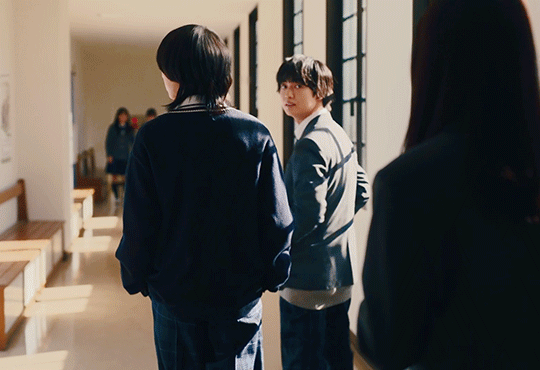
Regular readers may have noticed that I have a bit of a fixation on this character. I collaborated on a fansub largely because I wanted to see his scenes get translated. I wrote a four-part series of posts about him. Part of the reason for this is undoubtedly that he was played by one of my all-time blorbos, Sekoguchi Ryo. But Hatano also just stands out among the other Zettai BL characters. I mean, there's a reason the series of posts I wrote about him was called What's Different about Hatano. Of all Mob's suitors (and there are a lot of them), he's the only one besides Kikuchi who manages to get to know Mob and spend time with him. He's also the only one of Mob's suitors, period, who shows some awareness of Mob's other life as the main character of a show about living in BL World (albeit in an ambiguous way). And then there are all the other reasons why his approach to pursuing Mob and the way he's situated in relation to Mob make him unique...well, it's all in the posts.
Hatano's uniqueness in the Zettai BL-verse isn't the only thing I appreciate about him, though. At the end of the day, he just makes things happen and keeps things interesting. He pulls off the BL-within-a-BL storyline with aplomb. And I enjoy the way he has this icy, unflappable, unattainable persona with his peers but falls apart and turns into a flustered, agitated wreck around Mob.
Of course, I think Sekoguchi Ryo was wonderful in this role. A big part of playing Hatano is acting like you're in a dramatic scene when you're in a comedy, but sometimes a scene needs the level of deep commitment one would offer in a drama and sometimes it calls for something with a slight undercurrent of irony (without detracting from the genuineness of the character). Sekoguchi walks that line pretty much perfectly. He both sold me on Hatano's sincerity in funny scenes like the fantasy sequence where he responds to Mob's efforts to pawn him off on another teenager by curling up in his lap (!) and broke my heart in the fake angle kiss scene. But I wouldn't have expected any less.
Hayama Asami, 25 ji Akasaka de
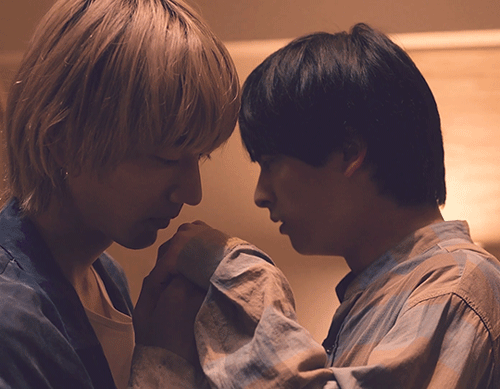
I have to admit, I went into 25 ji Akasaka de wanting and expecting to like Hayama. After all, he's played by Komagine Kiita, another favorite actor of mine. (Komagine and Sekoguchi Ryo starred together in Kikai Sentai Zenkaiger and their characters had a well-developed shippy relationship there, which has a lot to do with how much I like them both.) But I'm pretty sure I would have been fascinated with Hayama even without that bias. I love a good mid-series point-of-view revelation, and Hayama had a doozy of one. He ended up being one of the most psychologically complex characters I saw in BL this past year. I'm also a sucker for pining, and Hayama pines with the best of them. The episode 9 scene where Shirasaki hits on him with the pretense of needing acting help, forcing him to choose between pushing away the person he wants or being intimate with him in a way that's apparently meaningless, is a contender for the angstiest scene of the year. And I always enjoy when a character who's a huge pining, angst-y mess on the inside seems all cool and together on the outside (see above re: Hatano). With all this, it's no wonder I love Hayama. I don't think it's just my bias talking when I say I think Komagine knocked this performance out of the park. He impressed me immediately with his versatility, since Hayama is almost the complete opposite of his cinnamon-roll-on-speed character from Zenkaiger. He kept impressing me, after which the point-of-view switch episode was another step up. But it was the opening scene of episode 9 that really showed me what he was capable of. Komagine's performance was so subtle, immediate, and affecting that my respect for him went through the roof.
Shirasaki Yuki, 25 ji Akasaka de

Yep, I'm including both leads from this series. That's just how strong the series as a whole is, in my view.
Shirasaki has gotten a bad rap at times. It's understandable—Hayama is a (justifiably) beloved character and Shirasaki puts him through the ringer. Personally, I think he did pretty well given where he was at the beginning of the series and the circumstances he found himself in—including a carefully devised misunderstanding plot that, as @ginnymoonbeam demonstrated in a post on the subject, was written in such a way that his conclusions about Hayama were reasonably well-founded and not just the result of insecurity gone wild or something even more senseless (as occurs in a lot of BLs that are written with less care). But even if you think Shirasaki is a dick, he's still an interesting, vividly-drawn character who's frequently relatable even as he makes choices viewers find frustrating.
One of the aspects of Hayama's point-of-view reveal that I enjoyed the most wasn't about Hayama himself, but the side of Shirasaki that Hayama is able to see more clearly. When Shirasaki's point of view dominates the story, he emphasizes his insecurity. But when Hayama's does, we can see that Shirasaki has a kind of deep conviction about things that can come out in the form of a strident confidence that helps to balance out his self-doubt and self-effacement.
I may be partial to Shirasaki for another reason. I'm going to preface this by saying that this is just my take on this, and a rather tentative one at that. But since it's a real factor in my feelings about Shirasaki, I think it's worth mentioning. I have some significant people in my life who have autism and I've been exploring whether I may belong in that category myself (combined with my already-diagnosed ADHD, just to make things extra complicated). At the very least, I have quite a few attributes in common with autistic folks. You can probably guess where I'm going with this. To me, Shirasaki seems pretty autism-coded. He has strong opinions, to the point where they could seem rather black-and-white, but another way of looking at this is that he has carefully considered his stance on things and once he forms his views, he sticks to his guns. He's really observant about people in some ways, but comes off (to neurotypical folks, at least) as dense in others. (Boy, does that ever sound familiar.) These ways of thinking, and the social weirdness that they can sometimes entail, are very relatable to me and not something I see represented in media all that often, even when characters seem to resemble autistic folks in other respects.
I still yell at the screen sometimes when Shirasaki makes mistakes in this show. But at the end of the day, I think he's a well-written and engaging character, and I have an abiding fondness for him.
I should mention that this character wouldn't be nearly as compelling if Niihara Taisuke hadn't done such a good work in this role. Shirasaki is sensitive as hell and not great at masking, so his face is an open book a lot of the time. Niihara does a great job of giving the audience something to read there.
Fukaya Kai, Perfect Propose
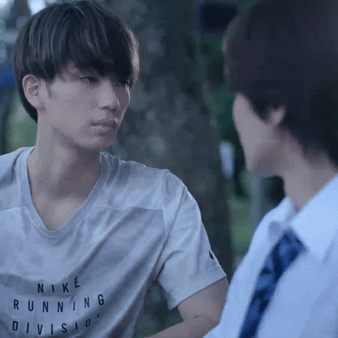
Just as I went into 25 ji with an agenda to like Hayama, I went into Perfect Propose with an agenda to like Hirokuni. I loved Kaneko Shunya in Ultraman Trigger and was excited to see him in this role. And I did like Hiro very much, and I was impressed with Kaneko's portrayal. But what I wasn't expecting was how much I would like Kai.
Part of it is just that Kai is a type of person I don't see very often in BL specifically or media generally. He's a direct, forthright guy, but doesn't show a ton of affect in his face or his voice. Whereas a lot of BL lead characters are pretty neurotic, Kai generally doesn't waste much thought on things that aren't truly important to him. He doesn't always share what he's thinking and feeling, but he also doesn't beat around the bush. One of the most striking examples of this is the time he offers to jerk Hiro off to help with his insomnia, but he also shows this tendency in other ways that grab the viewer's attention a bit less. Kai does have his share of insecurities, even if he doesn't show them very often. But his abiding faith in Hiro and their potential to be good partners to each other is sincere. Being so direct and so steadfast means that Kai is remarkably trustworthy, something that Hiro eventually grows to understand.
So Kai doesn't resemble a lot of BL lead characters. But he does resemble real people I've known in my life. I think part of the reason for this may be subtle gender coding that comes into play in BL writing. It's not inherently feminine to express your emotions, of course, nor is there any contradiction between masculinity and emotional expression. But there are more stoic types of masculine presentations that we don't see portrayed in a sympathetic light in romance plots that often, and stoic masculine people can have a particular kind of charm.
I'd be remiss if I didn't mention Nomura Kota's performance in this role. It's really restrained in a way that actually seems like it would require a lot of effort, particularly when you see in promotional settings that Nomura is much more animated than his character. Not that he shows that effort onscreen—he just seems like Kai.
honorable mention
Tanaka Kazuhito, Living with Him/Kare no Iru Seikatsu
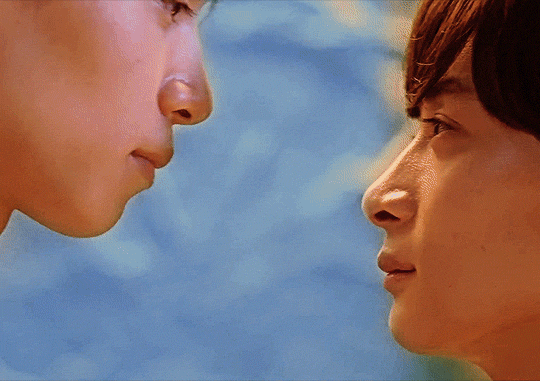
In the end, this series didn't really do justice to this character or to Sato Ryuga's admirable performance in the role. It seems to have fallen victim to some adaptation pitfalls, from what I've heard. But when this show worked, Kazuhito was fascinating, complex, and endearing, and Sato brought him to life with a combination of restraint and subtle intensity that got stuck in my head between episodes.
characters whose shows I watched for the first time this year
Ai Di, Kiseki: Dear to Me

What is left to say about this dude that hasn't already been said? He's one of the most highly concentrated characters ever to appear in a BL. If a typical BL lead were a glass of fountain soda, Ai Di would be yanking the tube out of the back of the machine and drinking straight syrup. And he wasn't even one of the leads! But he's not reliant on screen time. In a system full of gas giants, he's a little neutron star whose gravitational pull draws audience members' attention to him so strongly that his supporting character status becomes irrelevant. He's the littlest meow meow, the babiest girl, the most chaotic gremlin. A walking ball of trauma whose picture should be in textbooks next to the definition of disorganized attachment. And I haven't even gotten started on the outfits. I was a bit behind the zeitgeist when I watched Kiseki early this year, but I made up for lost time by getting an intense case of brainrot and engaging in some seriously excessive rewatching. Like so many other Kiseki appreciators, a big part of my interest in the show was driven by Ai Di.
It's impossible to talk about this character without acknowledging the seriously remarkable job Louis Chiang did in this part. I don't think Ai Di would have been nearly as fascinating if a different actor had played him. Chiang showed so many sides of Ai Di and every single one of them was so vivid and fascinating. That much-discussed intimate scene is his pièce de résistance, but it's just the tip of the iceberg. I'm sure I'm not the only person who is watching with great interest to see what Chiang does next.
Sky, Love in the Air

I didn't know what to expect going into Love in the Air, which is part of the reason I didn't watch it sooner. The second half of the series ended up blowing me away in a lot of respects. It has its issues, certainly. Sometimes the portrayal of Sky's trauma history and its present-day effects verges on being sensationalistic enough to feel exploitative, though it never crossed that line for me. But for the most part, I found that it resonated with my experience as a survivor of partner abuse and sexual violence to a remarkable degree.
Sky was written well, with a rare degree of understanding of interpersonal violence and the effects of trauma. But the character wouldn't have worked nearly as well if not for Peat's sensitive, nuanced performance. In a show with a lot of oversized characters, Peat wasn't afraid to dial things down in a way that ultimately made a bigger impression.
I'm going to be thinking about this one, and probably rewatching it, for a while!
character from a non-QL
Daichi, Ossan no Pantsu ga Nandatte Ii Janai ka!

For the first part of Ossan no Pantsu, Daichi functions primarily as a way for Makoto to learn and become a better father, partner, and boss. For a while there, he's in danger of becoming the gay equivalent of a "magical Negro," albeit one so adorable and wise beyond his years that it's tempting to ignore the fact that he occupies such a role in the story. Then Daichi turns out to have his own challenges—significant but ultimately manageable problems that Makoto sometimes exacerbates, but eventually helps with, rendering their relationship less one-sided. But it's only in the final arc of the show that we see that Daichi has been carrying around a much more profound wound than was hinted at before that point—and now Makoto, thanks in part to Daichi's help, is able to provide real support as he copes with its effects.
This progression works well to support Makoto's journey through the story and then afford him an opportunity to prove how far he's come by returning the favor, but it never felt contrived to me. After all, I've run into my share of overfunctioning young people who have done an admirable job of making up for the support they didn't get from one or more of their parents and ended up with a lot of valuable perspective that belies how much unresolved hurt they're carrying around. It's a type of person one is more likely to run into in queer communities given the risk of parental rejection that comes with it, so it's no coincidence that Daichi fits that bill completely.
Nakajima Sota seems a bit green to me in this role, like he's still working through a little bit of stiffness. He's charming enough that I hardly noticed this while I was watching OnP, though, and he seems to show growth as an actor just through the course of the series. He's a great fit for the part regardless, bringing a degree of warmth and charismatic sparkle to it that helps to justify why a stubborn middle-aged man would put so much stock in the opinions of a college student.
#abby's best of QL 2024#favorite bl characters of 2024#bl meta#ql meta#mitsuya-sensei no keikakuteki na edzuke#mr. mitsuya's planned feeding#mitsuya sensei no keikakuteki na ezuke#mitsuya ayamu#yamazaki masayoshi#hatano#zettai bl#zettai bl 3#zettai bl 2024#zettai bl ni naru sekai vs zettai bl ni naritakunai otoko#absolute bl#sekoguchi ryo#25 ji akasaka de#at 25:00 in akasaka#komagine kiita#hayama asami#shirasaki yuki#niihara taisuke#living with him#kare no iru seikatsu#tanaka kazuhito#sato ryuga#kiseki: dear to me#ai di#louis chiang#love in the air
31 notes
·
View notes
Note
I agree that the UA teachers should've had more connection to the students. How do you think certain teachers could've mentored certain hero students? All I can think of is Aizawa teaching Hanta cuz similar tools and Present Mic teaching Kyoka and Manga cuz sound and/or mouth-based Quirks. Maybe Cementoss teaching Ibara and Shoto and Kojiro cuz wide-scale attacks?
For the sake of this, I'm ignoring Vlad King, Recovery Girl, and Power Loader. I just don't think that they have a lot to offer the other students. And I'll also not cover your own suggestions. I do think those are good suggestions, which is why I feel like it'd be redundant to cover them.
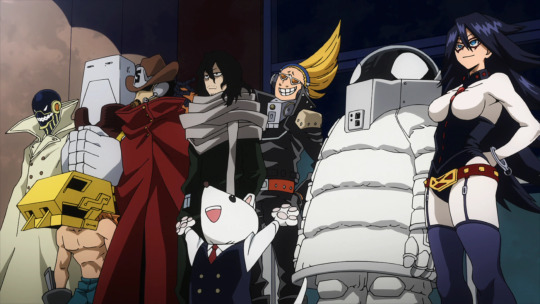
Gran Torino-Iida and Kosei: Gran Torino has the perfect ability to help both the boys in their own way. Whether pulling on his knowledge of movement to help out Iida or his reliance on his air flow to train Kosei.
Hound-Tsuyu and Jutora: Hound covers fields with both of these two, having an Animal Mutation with Tsuyu and have a similar skill set to Jutora. Shoot, they could even benefit from his knowledge on counseling, helping Tsuyu comfort people she's saving
Nezu-Momo and Monoma: This is less about helping them with their Quirks as much as it is helping out them as leaders and getting them to apply their own intellect as well as they can. Plus, it could help deal with the two's respective issues with egos early on.
Cementoss-Kirishima and Juzo: Cementoss can help these two in their own ways, improving Juzo's ability to move and apply his power and helping Kirishima improve his defenses. Especially since his own power can play against both of them so well.
Midnight-Denki and Komori: Denki and Komori both have Quirks with a lot of range and power, but not much in the way of control. Hey, just like Midnight. I'm sure she'd have plenty of tips on controlling and aiming such unwieldy powers.
Snipe-Aoyama and Rin: As tempted I was to put Pony here for the cow girl joke, I figured Aoyama and Rin needed Snipe's help more. The two need a lot of help reworking on their aim. Especially since the two can't seem to hit any living target.
Present Mic-Koda and Bondo: While these two do have Quirks that are based around the mouth, it's more about personality. Bondo and Koda are both extremely shy and can barely speak most times. So having Present Mic around could help a lot in breaking them out of their shells.
Thirteen-Mina and Kamakiri: These two have some of the most dangerous Quirks in either of their classes. Someone like Thirteen could help them exercise better control over their powers and help focus their intense energy into something more helpful, like dealing with rescue work.
Ectoplasm-Shoji and Setsuna: Ectoplasm has a power that makes it so he has to deal with plenty of sensory input and divided attention. This would make him a good fit for Setsunna and Shoji given how much their powers focus on information gathering and their own sensory abilities.
Eraserhead-Ojiro and Sen: Considering that these two are the go to hand to hand fighters of their respective classes, it's only fitting they work with the best marital artist in the series. Maybe they could even pick up some of his equipment, like Ojiro could get some clatrops to throw around or Sen could get the Capture Tape.
#My Hero Academia#Not Quirks#Shota Aizawa#Eraserhead#Hizashi Yamada#Present Mic#Nemuri Kayama#Midnight#Ken Ishiyama#Cementoss#Anan Kurose#Thirteen#Ryo Inui#Nezu#Hound#Ectoplasm#Snipe#MHA Meta#MHA Theory
49 notes
·
View notes
Note
Wait, if Fujieda said he knew exactly how Towa felt even seeing the similarity between them when they first met why didn’t he admit it in the beginning?
The reason why Fujieda never admitted that is because its like admitting that his existence is just as miserable as Towas.
23 notes
·
View notes
Text
Saki ramblings
I think it's funny that Aoi and Saki might outwardly look like opposites— the serious, reserved, anxious girl and the carefeee, outgoing optimist— bc what they both choose to say is very measured and there's a high degree of reservation for both. With Saki, it makes her appear downright flighty and oblique, whereas Aoi comes off as more lenient & docile & overall a lot more repressed lol I think it could be fun to write them both running into each others' emotional walls
The other thing that is fun is that Aoi generally likes talking about what bothers her. If you prod her, she tends to overshare. She is super consistent lol She likes being asked her opinions on things, having the chance to voice her misgivings w/o disturbing the morale of the group and to be reassured about things; plus she deeply dislikes having her concerns dismissed through "don't worry so much" lol
On the other hand, Saki gets annoyed/upset if you press her. Saki really isn't upfront about what she wants. She takes the edge off situations through jokes like Minoru (this makes the way she's rude to him extra funny lol Hating the mirror that reflects you, huh), but hers are more charged because even if she says it lightly, she's still taking notice to the ways the other respond. Sometimes she just wants to play around and be comforted without going into the gritty details and others she wants to actually talk about things sincerely but she won't openly say which time is which.
Her bluntness is interesting for me because she (& Floramon) tend to get annoyed when Takuma is tepid/too conciliatory, but Saki herself is fairly adverse to conflict. Not just disliking the fact they have to fight the mons, she gets outright weary of the group fights. That passage in pt4 where Aoi gets mad at Kaito and yells at him to let her handle the child digimon trio? Saki was 'oh boy, now even Aoi is getting mad.' So, it's funny that she gets annoyed at Takuma for being tepid when she herself doesn't wanna get involved in the arguments— even when she has a clear stance (Like when she told Minoru that voting on a human life was unethical. But still preferred to just watch Kaito and Shuuji fight, though she arguably agrees w/ Kaito). Both because she fears rejection so she would rather not disrupt the group and bc that conflict aversion.
At the beginning of the story, her bluntness reads more like impulsiveness for this reason. I'd have liked to see it evolve to a more conscious frankness tbh! (the response the affinity dialogues provide about her stance on conflict is really good though).
I love also love how utterly incompatible she's w/ Shuuji LOL I love So Much that affinity dialogue in pt3 where Shuuji is crying about the Professor & Saki can't stand him 😂 Despite sharing the risk/conflict aversion, they express it in such clashing ways. I love how utterly unfair she's to him in that scene. Part of Shuuji's conflict is that he isn't allowed to express that sensitive, crybaby side of his & it spills without control. He feels even less allowed as the oldest there, and it's such a moment that reinforces that. Not that you can blame Saki for not wanting/being able to engage, it's just that delicious incompatibility.
I also wish we had gotten more out of her and Ryo as foils because they're really similar in core ways: their desire to be accepted, extreme sensitivity to how they're perceived, their keenness; yet they'd seem to express in nearly opposite ways. I feel that they could've worked as a meta pair in a similar way Aoi n Shuuji do.
#digimon survive#Saki#OK this is just me reposting a twotter thread lkke they killed the bird so I better start actually transcribing my threads here lol#Aoi#Shuuji#Ryo#Survive posting best hit transcription#Meta#Mine
14 notes
·
View notes
Text
Zettai BL Ni Naru Sekai VS Zettai BL Ni Naritakunai Otoko 2024 - Episode 5 Eng Sub


VS THE START OF A ROMANCE and VS HELPING
For downloading instructions and where to find the raw files, please check our masterpost.
[Subs link]
We ask that you not upload our subs to streaming sites.
Sharing with friends is fine. We’re also OK with folks sharing them in other ways as long as they aren’t public. Please use discretion when talking about the fansub outside of tumblr, but don’t hesitate to get the word out in other ways, and feel free to promote it here. Please credit ikeoji-subs whenever possible—we put a lot of time and effort into this.
Feel free to use the fansub for fandom purposes. Gif-making, meta-writing, and other fandom-related creative endeavors made using our fansub are not only welcome but encouraged.
Thank you so much, as always, to everyone who has left nice comments in the tags and such. Y'all really make the hard work we put into this worthwhile!
And big big thanks to @my-rose-tinted-glasses for gifs and spreading the word about the fansub.
translation notes:
About “naresome”
As tends to happen when translating Japanese, this is one of those words that don’t exist in English. Its literal translation is “the start of a romance.” So, while we’ve chosen to translate it as “get together,” it would be more accurate to give a more extensive explanation. It is a noun that specifically refers to the moment that love begins. So when we’re talking about “naresome” we’re talking about the thing or situation that triggered the romantic relationship or romantic feelings.–Snow
about casting Tominaga Yuya as a guy who gets busy when it rains
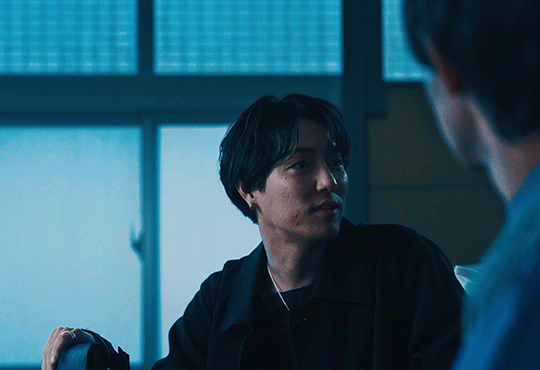
I think this is another tokusatsu Easter egg. Tominaga Yuya, who plays Jouji in the “Vs. The Start of a Relationship” chapter, was also on Avataro Sentai DonBrothers, a Super Sentai series that ran from 2022 to 2023. His character, Sonoi, was the agent of a culture from another plane of existence whose members feed off of the brainwaves of human beings. At first, he and his associates Sonoza and Sononi were enemies of the DonBrothers, but they eventually joined forces with the Sentai. A big reason this happened was that Sonoi had a special connection to the leader of the DonBrothers, Momoi Tarou. Their relationship reads as pretty darned queer to a lot of viewers, myself included.

Momoi Tarou and Sonoi bonding, before they found out they were nemeses
Many JBL fans know Higuchi Kouhei from My Personal Weatherman/Taikan Yoho, in which he played the titular meteorologist, Segasaki. Part of the premise of that series is that at the start of the story, Higuchi’s character only has sex with his partner on sunny days. Jouji, Tominaga’s Zettai BL character, does the opposite: he and his “sex friend” only do it on rainy days.
Basically, the writers of Zettai BL 3 have made Higuchi’s toku boyfriend’s story into a reverse Taikan Yoho situation. What are the odds that’s just a coincidence?–Towel
Also, he gets his own “Zettai BL” title card moment (and he’s the only one out of the secondary cast who get to have that).–Snow
That’s right!
I’m going to put this in context a little because I’ve given a lot of thought (probably too much) to who’s been featured in the opening credits of the different Zettai BL seasons. For every season of the show so far, Inukai Atsuhiro has had four other actors perform with him in the opening theme dance number. (All of whom also get a crack at some of those title card moments.) For two seasons, three of the four spots were taken up by Yutaro (Ayato), Shiono Akihisa (Toujou), and Itou Asahi (Kikuchi). The fourth spot was taken up by different actors in the first two seasons. It was the guy who played the attractive dude from the goukon in the first season, and it was Izuka Kenta, who played Kikuchi’s ex Igarashi, in the second.
This time around, I had hoped that Sekoguchi Ryo would take the fourth spot, because he’s my blorbo and of course I wanted to see him in a retro dance number (boy was that wish ever granted!). But I hadn’t expected Shiono not to appear this time. Maybe there were specific reasons for this, like a scheduling conflict or an injury. It’s not like Shiono appears less in season 3 than he did in the others, so that’s not the reason. It’s hard to say. But in that context, it seems even more significant that they gave a spot to Tominaga Yuya. We don’t know the reasons for this. But it’s possible they featured him more heavily in this way because of his tokusatsu backstory and the inside joke it allowed them to make.–Towel
about “pudding relationship” and “prince and princess”

This part was tricky to translate. As you might have noticed by this point, Mob likes to make puns. In Japanese, pudding is written as “purin” and it is used to refer to pudding as well as custard. Mob goes on to follow with “prince and princess”, which in Japanese are pronounced as “purinsu” and “purinsesu”. In here, there’s wordplay with these similar sounding words and the image of the ToujouAyato couple.–Snow
about “cuteness overload”
Japanese is a language that uses a lot of onomatopoeia. There’s 4 types, iirc: animal sounds, object sounds (like rain, creaking and the like), things that don’t make noise (smiles, stares, silence, etc), verbs turned onomatopoeia (I unfortunately cannot remember this properly but it was something like that). In this case, Mob says “Kyun ga tomaranai” (which literally means “the kyun can’t be stopped”). “Kyun” is an onomatopoeic word to refer to a “momentary tightening of one's chest caused by powerful feelings,” usually tied to a romantic context but not exclusively. Taking this into account, we thought “cuteness overload” might be the closest expression in English.–Snow
It’s worth noting that Mob is also saying “kyun” right after the “cuteness overload” line. I really thought at first that he was saying “cute,” since it sounds so similar, it would make a lot of sense contextually, and English loan words are so common in Japanese. But no, it was “kyun.” There was no way we could get across the meaning of “kyun” in one or two syllables of English, so we went with “adorbs,” which is just another word for “cute,” but at least it has a cutesy pronunciation that steps it up a notch.–Towel
about bouhan buzzers (16:06)


The translation note shown onscreen during this scene reads: “a bouhan buzzer is a security gadget carried by Japanese schoolchildren.” We did our best to summarize the meaning of this term briefly, so that it would be readable in the amount of time it was possible for us to keep that caption onscreen. But here’s a longer explanation for those who might be curious.
It took a while for me to understand what these things were. At first I pictured something like a hand buzzer–the kind that people used to use to prank people. But it’s nothing like that. They’re sometimes referred to as “personal security alarms.” They’re little doodads that you can clip onto a backpack or carry in your pocket, and if you activate them (the most common mechanism for which seems to be pulling some kind of tab or string), they make some form of alarm-type sound. I found a video, below, that shows someone activating two different types of buzzers, showing the sound they make.
youtube
These two make the same sort of beeping/chirping noises you’d associate with an alarm protecting a car or the entrance to a building–not really a “buzzing” sound, or anything that resembles the sound Mr. Cheerleader makes in this scene. But maybe there are other types that are more buzz-like, or sound more like the sound our buddy is imitating.
According to some things I read when I looked these up, children often play with their bouhan buzzers, making it somewhat less likely that people will be on alert when they hear them go off. I don’t think I could have resisted setting off a gadget like this if I’d had one as a child. They seem to be available with all sorts of characters on them and in all sorts of colors and shapes, which is cool but might make them seem even more toy-like.
From what I’ve seen, these things are most commonly used by children, but adults sometimes use them too. If you look for them for sale online, there are more adult-looking versions available (say, a rose-gold blob instead of something with cute characters on it–though of course, adults might want those too). One listing I saw advertised that they’re useful for kids, women, and the elderly.–Towel
Tag list: @absolutebl @bengiyo @c1nto @come-back-serotonin @lurkingshan @my-rose-tinted-glasses @porridgefeast @sorry-bonebag @twig-tea @wen-kexing-apologist
#zettai bl#zettai bl 3#zettai bl season 3#zettai bl 2024#zettai bl ni naru sekai vs zettai bl ni naritakunai otoko#a man who defies the world of bl#absolute bl#translation notes#tominaga yuya#donbrothers#taikan yoho#Youtube
82 notes
·
View notes